Personal Narrative Essay on Love
What is the word love? Love. It’s a noun and can often a verb. It’s a word people use for many things, most commonly used for telling each other how we feel about them. The word has a powerful meaning behind it. According to a Psychologist, they believe “To love someone means to really care about that person, to be enamored by them. Love can be platonic or romantic, but it means to understand who that person is and cherish them for it.” But sometimes love doesn't mean what it should, sometimes the word is used so carelessly. We hear the word so often we forget it's supposed to have such a powerful meaning behind it, it's more than just four letters thrown together, It points ever so weakly at the strongest emotion we allow ourselves to feel but sometimes we misuse and abuse the word, slowly changing its power and turning it into just another word.
The word love has power; enough power to make even the sanest people go insane. We come to learn this word at such an early age. As children, our parents tell us they love us, we tell our friends we love them, you might even tell your boyfriend or girlfriend you love them. But what if the person who told you they loved you breaks your heart? What if the person who tells you they love you leaves you? But didn’t they say they loved you? But I thought love was such a potent emotion, I thought the word had such significant power behind it? Why? Does the word not mean the same thing to you as it means to me? How come it's the ones we love that hurt us the most? Maybe love doesn’t mean what we think it does, maybe it is simply just another word. We love the things that make us happy. Dad left because he and Mom weren’t happy anymore they no longer loved each other like they once did. It happens. Sometimes we fall out of love with people. But what happened to “till death do us apart” were those also just words. But Dad left so he would be happy. I want him to be happy. But our definitions of happiness are not the same, my dad brought me happiness. He made me happy, but he didn't feel the same. His happiness had a different definition. His happiness didn't include me. But kids are supposed to make their parents happy right? Parents are supposed to have unconditional love for their kids right? He still loves me right or is his definition of love also different from mine? Soon he’ll stop coming to my soccer games, and my school ceremonies, and soon all my calls will just go to voicemail, and my texts will no longer get responses, there will be no more birthday letters and I will wish for the same thing every year when I blow out my candles, I will wish for the love my dad once had for me to return every year until I slowly come to understand the meaning and power behind the word love is nothing more than what a person gives it. We use sometimes words that have beautiful strong meanings with the cruelest intentions. And so where the word love was once used to describe such a strong powerful emotion has now been replaced with hate. Soon he’ll stop coming to my soccer games, and my school ceremonies, and soon all my calls will just go to voicemail, and my texts will no longer get responses, there will be no more birthday letters and I will wish for the same thing every year when I blow out my candles, I will wish for the love my dad once had for me to return every year until I slowly come to understand the meaning and power behind the word love is nothing more than what a person gives it. They say there is a fine line between love and hate. They are perfect antonyms for each other meaning the exact opposite from the other. When you love someone, THEY are all you think about but when you hate someone IT’S all that you can think about.
Two words, two of the strongest emotions with opposite meanings end up having the same effect. When we are younger, we are taught that words are just letters put together to create a sound, most kids are taught “Sticks and stones may break my bones, but words will never hurt me” but the older we get the more we realize how wrong that catchy little jingle is. Words hurt. Words are potent, they have power behind them. Words can build or tear down anything they please. Words can easily be manipulated, they can be used to create lies, and they can hurt us. The words that once had power now mean nothing and the words that once had the power to heal us, and fill our hearts with immense joy, now hurt us and leaves us alone and heartbroken.God will use words and create light and the devil will use the same words and create darkness, how do the same words have different meanings behind them? How can two antonyms be synonyms? Why do you hate someone you once loved? Why do you love the person you should hate? Why does the word “love” always leave people feeling the most pain? But they said words would never hurt me... I said words would never hurt me... But the words are hurting. Words aren't physical they aren't leaving me with bruises or scratches, they aren't breaking my bones, but they breaking me, they are breaking me on the inside, they are slowly destroying me, they are slowly destroying my happiness, they are breaking my trust, they are taking away my confidence, they have left me sitting alone lost in the darkness. The same words I once thought meant something no longer mean anything. I love you. I love you. I love you. I love you.
I used to think Those three simple words made up of only eight letters were beautiful. I used to trust those words, but I no longer trust them because I have learned they can be twisted and used against you. We are puppeteers, and words are our puppets. We give the words life, and we create the happiness, the pain, the sorrow, the emotion behind each word and we can easily strip a word of its power leaving it as just another word. Beautiful words no longer mean beautiful things. Words that once made us smile now make us cry, words that once meant something now mean nothing. And just like that the word “love” once having such powerful meaning behind it, now means the same as “liking” it no longer carries such a powerful meaning behind it. We have stripped it of its beauty leaving it as just another word in the dictionary.

Related Samples
- The Emotional Support Sibling Essay Example
- Personal Narrative Essay: Leaders From My Life
- Workplace Meeting Essay Example
- Three Types of High School Baseball Players
- What makes someone successful?
- Improving Workplace Culture by Improving Employee’s Mental Health
- The Pay Gap Between Men and Women Over a Lifetime
- Personal Goals Essay: Climbing Mount Everest
- Essay on Emotions (in Ads): A Well Known Feeling
- College Athletes Should Not Be Paid Argumentative Essay Example
Didn't find the perfect sample?

You can order a custom paper by our expert writers
Love and Relationship Essay
The word ‘love’ is observed to have distinct meanings in various settings and contexts. Different people from various cultural settings would tend to have different perceptions about love. Generally, love refers to some kind of inexplicable feeling which is felt by people towards others, probably those of the opposite sex. Relationship on the other hand would refer to the condition of people being connected or associated with each other.
We have all experienced love at one moment of life, but it is as though there is still much we don’t know about love itself. Humans have always asked inexplicable questions about love such as, “Why do we fall in love?” or “What makes us love others?” We may not necessarily have perfect answers for all the questions regarding love but there is no doubt that we have been closer to the right answers for most of these questions through the perception of psychologists.
For instance, according to love psychologists, the reason as to why we fall in love will depend on our minds. The way our minds perceive love is what comes out to us as love. Sometimes, these perceptions may match with the perceptions of another person and in that case love is certain to be realized.
Different groups of people have different views about love. Some communities would see it as something that would be contained in the eyes while others just associate it with blood thus the observations ‘love is in the eyes of the beholder’ and ‘blood is thicker than water’ respectively.
However, some aspects in life have come up to disqualify these perceptions, making people to search for other alternative explanations. For instance, let us consider the situation of blind people. Does their incapability to see hinder them from loving? More importantly, if love was really contained in the blood, will there be any cases concerning lost identities in life as we can see today?
Having asked ourselves these questions, it would be easy for us to appreciate the psychological view of love that is determined by our minds as the perfect answer to most of the questions we frequently ask ourselves regarding love. The issue of love and what makes people fall in love has been a subject of debate all over the world for a very long time. There may never be false love as some thinkers would observe, but we are all informed of the many uncertainties associated with love nowadays.
Think of someone who is strolling down the street without any specific focus or intention then suddenly, he bumps on a lady and it happens they fall in love at the first sight. How can this situation be explained? There is no other perfect manner we can explain this but through the ‘idea of the mind.’
What had just happened between the two people would depend on their brains. Single people; ones who are not in any relationship will always be in hunt for love and if someone fitting their criteria crosses their path, they will definitely be attracted to them and these feelings would trigger love instantly.
The person in this example fell in love with the lady she met on the street owing to the opportunistic perceptions of his mind that he was single and he needed a lover. This is just what happens to many people in this world as far as love is concerned.
As it would be observed, most people would appear to be crazy in love at the beginning of their relationship. This however is likely to change over the time and that fire would fade away as they continue seeing each other. They can even start having feelings of hate against each other.
This is another stand which can be used to justify the hypothesis in this argument. Most of the times, humans are misguided by their minds to make instant choices about love, instead of taking their time to think of the possible outcomes which are likely to arise later. This way, they end up making the wrong choices in what can be termed as ‘rushed love.’ This is a misunderstood situation that would be characterized by arguments and hate against each other come in the future.
To avoid such situations, psychologists have observed a number of factors for people to consider before thinking of falling in love. First of all, we should try to establish a checklist about the things we expect to see in our future lovers and some of the aspects which can apply in the checklist might include behavior, appearance, and education. A checklist is more likely to guide us to the right people thus sparing us future disappointments in relationships.
Through the observations of this topic, we get to learn the benefits of psychology in helping us come into terms with some behaviors and processes of life. Through psychology, we can gain practical benefits regarding various aspects of life. Psychology is always certain to offer satisfying answers to most of the questions we may frequently ask ourselves about many things facing us in our daily lives.
For instance, in the above case concerning love psychology would provide the right answers and the perfect guideline on how to go about it without regrets. This would help people make the right decisions thus avoiding future disappointments. In this case, we should see the capability of psychology in giving us the perfect guideline about sensitive issues of life.
- The Paradox of the California Dream
- Lockheed Martin Corporation's Information Security Checklist
- Children Safety Considerations Table and Checklist
- Relevance of Narcissistic Personality Disorder
- Addiction to an Experience
- Insomnia: A Sleeping Disorder Type
- Psychological Measurements and Requirements
- Studying Brain's Inner Workings
- Chicago (A-D)
- Chicago (N-B)
IvyPanda. (2019, May 2). Love and Relationship. https://ivypanda.com/essays/love-and-relationship-essay/
"Love and Relationship." IvyPanda , 2 May 2019, ivypanda.com/essays/love-and-relationship-essay/.
IvyPanda . (2019) 'Love and Relationship'. 2 May.
IvyPanda . 2019. "Love and Relationship." May 2, 2019. https://ivypanda.com/essays/love-and-relationship-essay/.
1. IvyPanda . "Love and Relationship." May 2, 2019. https://ivypanda.com/essays/love-and-relationship-essay/.
Bibliography
IvyPanda . "Love and Relationship." May 2, 2019. https://ivypanda.com/essays/love-and-relationship-essay/.
- Features for Creative Writers
- Features for Work
- Features for Higher Education
- Features for Teachers
- Features for Non-Native Speakers
- Learn Blog Grammar Guide Community Events FAQ
- Grammar Guide
Telling the Story of Yourself: 6 Steps to Writing Personal Narratives

Jennifer Xue

Table of Contents
Why do we write personal narratives, 6 guidelines for writing personal narrative essays, inspiring personal narratives, examples of personal narrative essays, tell your story.
First off, you might be wondering: what is a personal narrative? In short, personal narratives are stories we tell about ourselves that focus on our growth, lessons learned, and reflections on our experiences.
From stories about inspirational figures we heard as children to any essay, article, or exercise where we're asked to express opinions on a situation, thing, or individual—personal narratives are everywhere.
According to Psychology Today, personal narratives allow authors to feel and release pains, while savouring moments of strength and resilience. Such emotions provide an avenue for both authors and readers to connect while supporting healing in the process.
That all sounds great. But when it comes to putting the words down on paper, we often end up with a list of experiences and no real structure to tie them together.
In this article, we'll discuss what a personal narrative essay is further, learn the 6 steps to writing one, and look at some examples of great personal narratives.
As readers, we're fascinated by memoirs, autobiographies, and long-form personal narrative articles, as they provide a glimpse into the authors' thought processes, ideas, and feelings. But you don't have to be writing your whole life story to create a personal narrative.
You might be a student writing an admissions essay , or be trying to tell your professional story in a cover letter. Regardless of your purpose, your narrative will focus on personal growth, reflections, and lessons.
Personal narratives help us connect with other people's stories due to their easy-to-digest format and because humans are empathising creatures.
We can better understand how others feel and think when we were told stories that allow us to see the world from their perspectives. The author's "I think" and "I feel" instantaneously become ours, as the brain doesn't know whether what we read is real or imaginary.
In her best-selling book Wired for Story, Lisa Cron explains that the human brain craves tales as it's hard-wired through evolution to learn what happens next. Since the brain doesn't know whether what you are reading is actual or not, we can register the moral of the story cognitively and affectively.
In academia, a narrative essay tells a story which is experiential, anecdotal, or personal. It allows the author to creatively express their thoughts, feelings, ideas, and opinions. Its length can be anywhere from a few paragraphs to hundreds of pages.
Outside of academia, personal narratives are known as a form of journalism or non-fiction works called "narrative journalism." Even highly prestigious publications like the New York Times and Time magazine have sections dedicated to personal narratives. The New Yorke is a magazine dedicated solely to this genre.
The New York Times holds personal narrative essay contests. The winners are selected because they:
had a clear narrative arc with a conflict and a main character who changed in some way. They artfully balanced the action of the story with reflection on what it meant to the writer. They took risks, like including dialogue or playing with punctuation, sentence structure and word choice to develop a strong voice. And, perhaps most important, they focused on a specific moment or theme – a conversation, a trip to the mall, a speech tournament, a hospital visit – instead of trying to sum up the writer’s life in 600 words.
In a nutshell, a personal narrative can cover any reflective and contemplative subject with a strong voice and a unique perspective, including uncommon private values. It's written in first person and the story encompasses a specific moment in time worthy of a discussion.
Writing a personal narrative essay involves both objectivity and subjectivity. You'll need to be objective enough to recognise the importance of an event or a situation to explore and write about. On the other hand, you must be subjective enough to inject private thoughts and feelings to make your point.
With personal narratives, you are both the muse and the creator – you have control over how your story is told. However, like any other type of writing, it comes with guidelines.
1. Write Your Personal Narrative as a Story
As a story, it must include an introduction, characters, plot, setting, climax, anti-climax (if any), and conclusion. Another way to approach it is by structuring it with an introduction, body, and conclusion. The introduction should set the tone, while the body should focus on the key point(s) you want to get across. The conclusion can tell the reader what lessons you have learned from the story you've just told.
2. Give Your Personal Narrative a Clear Purpose
Your narrative essay should reflect your unique perspective on life. This is a lot harder than it sounds. You need to establish your perspective, the key things you want your reader to take away, and your tone of voice. It's a good idea to have a set purpose in mind for the narrative before you start writing.
Let's say you want to write about how you manage depression without taking any medicine. This could go in any number of ways, but isolating a purpose will help you focus your writing and choose which stories to tell. Are you advocating for a holistic approach, or do you want to describe your emotional experience for people thinking of trying it?
Having this focus will allow you to put your own unique take on what you did (and didn't do, if applicable), what changed you, and the lessons learned along the way.
3. Show, Don't Tell
It's a narration, so the narrative should show readers what happened, instead of telling them. As well as being a storyteller, the author should take part as one of the characters. Keep this in mind when writing, as the way you shape your perspective can have a big impact on how your reader sees your overarching plot. Don't slip into just explaining everything that happened because it happened to you. Show your reader with action.

You can check for instances of telling rather than showing with ProWritingAid. For example, instead of:
"You never let me do anything!" I cried disdainfully.
"You never let me do anything!" To this day, my mother swears that the glare I levelled at her as I spat those words out could have soured milk.
Using ProWritingAid will help you find these instances in your manuscript and edit them without spending hours trawling through your work yourself.
4. Use "I," But Don't Overuse It
You, the author, take ownership of the story, so the first person pronoun "I" is used throughout. However, you shouldn't overuse it, as it'd make it sound too self-centred and redundant.
ProWritingAid can also help you here – the Style Report will tell you if you've started too many sentences with "I", and show you how to introduce more variation in your writing.
5. Pay Attention to Tenses
Tense is key to understanding. Personal narratives mostly tell the story of events that happened in the past, so many authors choose to use the past tense. This helps separate out your current, narrating voice and your past self who you are narrating. If you're writing in the present tense, make sure that you keep it consistent throughout.

6. Make Your Conclusion Satisfying
Satisfy your readers by giving them an unforgettable closing scene. The body of the narration should build up the plot to climax. This doesn't have to be something incredible or shocking, just something that helps give an interesting take on your story.
The takeaways or the lessons learned should be written without lecturing. Whenever possible, continue to show rather than tell. Don't say what you learned, narrate what you do differently now. This will help the moral of your story shine through without being too preachy.
GoodReads is a great starting point for selecting read-worthy personal narrative books. Here are five of my favourites.
Owl Moon by Jane Yolen
Jane Yolen, the author of 386 books, wrote this poetic story about a daughter and her father who went owling. Instead of learning about owls, Yolen invites readers to contemplate the meaning of gentleness and hope.
Night by Elie Wiesel
Elie Wiesel was a teenager when he and his family were sent to Auschwitz concentration camp in 1944. This Holocaust memoir has a strong message that such horrific events should never be repeated.
The Diary of a Young Girl by Anne Frank
This classic is a must-read by young and old alike. It's a remarkable diary by a 13-year-old Jewish girl who hid inside a secret annexe of an old building during the Nazi occupation of the Netherlands in 1942.
The Year of Magical Thinking by Joan Didion
This is a personal narrative written by a brave author renowned for her clarity, passion, and honesty. Didion shares how in December 2003, she lost her husband of 40 years to a massive heart attack and dealt with the acute illness of her only daughter. She speaks about grief, memories, illness, and hope.
Educated by Tara Westover
Author Tara Westover was raised by survivalist parents. She didn't go to school until 17 years of age, which later took her to Harvard and Cambridge. It's a story about the struggle for quest for knowledge and self-reinvention.
Narrative and personal narrative journalism are gaining more popularity these days. You can find distinguished personal narratives all over the web.
Curating the best of the best of personal narratives and narrative essays from all over the web. Some are award-winning articles.
Narratively
Long-form writing to celebrate humanity through storytelling. It publishes personal narrative essays written to provoke, inspire, and reflect, touching lesser-known and overlooked subjects.
Narrative Magazine
It publishes non,fiction narratives, poetry, and fiction. Among its contributors is Frank Conroy, the author of Stop-Time , a memoir that has never been out of print since 1967.
Thought Catalog
Aimed at Generation Z, it publishes personal narrative essays on self-improvement, family, friendship, romance, and others.
Personal narratives will continue to be popular as our brains are wired for stories. We love reading about others and telling stories of ourselves, as they bring satisfaction and a better understanding of the world around us.
Personal narratives make us better humans. Enjoy telling yours!

Write like a bestselling author
Love writing? ProWritingAid will help you improve the style, strength, and clarity of your stories.
Jennifer Xue is an award-winning e-book author with 2,500+ articles and 100+ e-books/reports published under her belt. She also taught 50+ college-level essay and paper writing classes. Her byline has appeared in Forbes, Fortune, Cosmopolitan, Esquire, Business.com, Business2Community, Addicted2Success, Good Men Project, and others. Her blog is JenniferXue.com. Follow her on Twitter @jenxuewrites].
Get started with ProWritingAid
Drop us a line or let's stay in touch via :
Essays About Love and Relationships: Top 5 Examples
Love, romance, and relationships are just as complicated and messy as they are fascinating. Read our guide on essays about love and relationships.
We, as humans, are social beings. Humanity is inclined towards living with others of our kind and forming relationships with them. Love, whether in a romantic context or otherwise, is essential to a strong relationship with someone. It can be used to describe familial, friendly, or romantic relationships; however, it most commonly refers to romantic partners.
Love and relationships are difficult to understand, but with effort, devotion, and good intentions, they can blossom into something beautiful that will stay with you for life. This is why it is important to be able to discern wisely when choosing a potential partner.
5 Essay Examples
1. love and marriage by kannamma shanmugasundaram, 2. what my short-term relationships taught me about love and life by aaron zhu, 3. true love waits by christine barrett, 4. choosing the right relationship by robert solley, 5. masters of love by emily esfahani smith, 1. what is a healthy romantic relationship, 2. a favorite love story, 3. relationship experiences, 4. lessons relationships can teach you, 5. love and relationships in the 21st century, 6. is marriage necessary for true love.
“In successful love marriages, couples have to learn to look past these imperfections and remember the reasons why they married each other in the first place. They must be able to accept the fact that neither one of them is perfect. Successful love marriages need to set aside these superior, seemingly impossible expectations and be willing to compromise, settling for some good and some bad.”
Shanmugasundaram’s essay looks at marriage in Eastern Cultures, such as her Indian traditions, in which women have less freedom and are often forced into arranged marriages. Shanmugasundaram discusses her differing views with her parents over marriage; they prefer to stick to tradition while she, influenced by Western values, wants to choose for herself. Ultimately, she has compromised with her parents: they will have a say in who she marries, but it will be up to her to make the final decision. She will only marry who she loves.
“There is no forever, I’ve been promised forever by so many exes that it’s as meaningless to me as a homeless person promising me a pot of gold. From here on out, I’m no longer looking for promises of forever, what I want is the promise that you’ll try your best and you’ll be worth it. Don’t promise me forever, promise me that there will be no regrets.”
In Zhu’s essay, he reflects on his lessons regarding love and relationships. His experiences with past partners have taught him many things, including self-worth and the inability to change others. Most interestingly, however, he believes that “forever” does not exist and that going into a relationship, they should commit to as long as possible, not “forever.” Furthermore, they should commit to making the relationship worthwhile without regret.
“For life is a constant change, love is the greatest surprise, friendship is your best defense, maturity comes with responsibility and death is just around the corner, so, expect little, assume nothing, learn from your mistakes, never fail to have faith that true love waits, take care of your friends, treasure your family, moderate your pride and throw up all hatred for God opens millions of flowers without forcing the buds, reminding us not to force our way but to wait for true love to happen perfectly in His time.”
Barrett writes about how teenagers often feel the need to be in a relationship or feel “love” as soon as possible. But unfortunately, our brains are not fully matured in our teenage years, so we are more likely to make mistakes. Barrett discourages teenagers from dating so early; she believes that they should let life take its course and enjoy life at the moment. Her message is that they shouldn’t be in a rush to grow up, for true love will come to those who are patient. You might also be interested in these essays about commitment and essays about girlfriends .
“A paucity of common interests gets blamed when relationships go south, but they are rarely the central problem. Nonetheless, it is good to have some — mostly in terms of having enough in common that there are things that you enjoy spending time doing together. The more important domains to consider are personality and values, and when it comes to personality, the key question is how does your potential partner handle stress.”
Solley, from a more psychological perspective, gives tips on how one can choose the ideal person to be in a relationship with. Love is a lifetime commitment, so much thought should be put into it. One should look at culture, values regarding spending money, and common interests. Solley believes that you should not always look for someone with the same interests, for what makes a relationship interesting is the partners’ differences and how they look past them.
“There are two ways to think about kindness. You can think about it as a fixed trait: Either you have it or you don’t. Or you could think of kindness as a muscle. In some people, that muscle is naturally stronger than in others, but it can grow stronger in everyone with exercise. Masters tend to think about kindness as a muscle. They know that they have to exercise it to keep it in shape. They know, in other words, that a good relationship requires sustained hard work.”
Smith discusses research conducted over many years that explains the different aspects of a relationship, including intimacy, emotional strength, and kindness. She discusses kindness in-depth, saying that a relationship can test your kindness, but you must be willing to work to be kind if you love your partner. You might also be interested in these essays about divorce .
6 Writing Prompts On Essays About Love and Relationships

Everyone has a different idea of what makes a great relationship. For example, some prioritize assertiveness in their partner, while others prefer a calmer demeanor. You can write about different qualities and habits that a healthy, respectful relationship needs, such as quality time and patience. If you have personal experience, reflect on this as well; however, if you don’t, write about what you would hope from your future partner.
Love and relationships have been an essential element in almost every literary work, movie, and television show; an example of each would be Romeo and Juliet , The Fault in Our Stars , and Grey’s Anatomy . Even seemingly unrelated movies, such as the Star Wars and Lord of the Rings franchises, have a romantic component. Describe a love story of your choice; explain its plot, characters, and, most importantly, how the theme of love and relationships is present.
If you have been in a romantic relationship before, or if you are in one currently, reflect on your experience. Why did you pursue this relationship? Explore your relationship’s positive and negative sides and, if applicable, how it ended. If not, write about how you will try and prevent the relationship from ending.
All our experiences in life form us, relationships included. In your essay, reflect on ways romantic relationships can teach you new things and make you better; consider values such as self-worth, patience, and positivity. Then, as with the other prompts, use your personal experiences for a more interesting essay. Hou might find our guide on how to write a vow helpful.
How love, romance, and relationships are perceived has changed dramatically in recent years; from the nuclear family, we have seen greater acceptance of same-sex relationships, blended families, and relationships with more than two partners—research on how the notion of romantic relationships has changed and discuss this in your essay.

More and more people in relationships are deciding not to get married. For a strong argumentative essay, discuss whether you agree with the idea that true love does not require marriage, so it is fine not to get married in the first place. Research the arguments of both sides, then make your claim.
Check out our guide packed full of transition words for essays . If you’re still stuck, check out our general resource of essay writing topics .

Martin is an avid writer specializing in editing and proofreading. He also enjoys literary analysis and writing about food and travel.
View all posts
Narrative Essay Writing
Personal Narrative Essay

Personal Narrative Essay - Easy Guide & Examples
16 min read
Published on: Apr 18, 2020
Last updated on: Mar 24, 2024

People also read
How to Write a Narrative Essay in Simple Steps
Interesting Narrative Essay Topics and Ideas
20+ Top Narrative Essay Examples by Experts
Share this article
A personal narrative essay can be a fun way to share your life story with friends and family. However, most students have no idea how to write a personal narrative essay.
This can be a challenge. On top of that, it's one of the most common assignments in school.
Is this something that you are also dealing with? Fortunately, you don't have to worry anymore! We are here to simplify the process for you.
This guide will walk you through the process of writing a personal narrative essay step by step. Plus, you can find plenty of examples here to help you get started and avoid common writing mistakes.
So what are you waiting for, take a step forward to make your essay shine!
On This Page On This Page -->
Personal Narrative Essay Definition
What is a Personal Narrative Essay?
A personal narrative essay is also referred to as short storytelling. It depends on the writer's type of story they want to tell the readers. This type of essay can be composed of the personal experience of the writer.
A personal narrative essay is usually written in the first person participle. It helps to depict a clear narrative thatâs focused on a specific moment.
Usually, high school students are usually assigned to write such essays. Writing these essays helps them to enhance creative writing skills. Also, they help to provide insight into a studentâs personal life.
To write a personal narrative essay, the writer specifies a plot around which the entire essay revolves. Moreover, the plot should also discuss the characters that have played some part in the story.
Sample Personal Narrative Essay (PDF)
How to Start a Personal Narrative Essay?
The personal narrative essay requires a balance between objectivity and subjectivity. To write about an event or situation with significance, you must first identify what's important to share with the readers.
As with other types of writing - there are some guidelines you need to follow some guidelines. These are;
1. Choose the Right Topic
A good topic can not just make your essay look good, but also it will make the writing process much easier. Since personal narrative essays are written on personal experiences and thoughts, make sure you choose your most interesting experience.
Keep in mind that the topic you choose matches the intended audience. It is the reader who decides the scope and success of your essay.
2. Choose a Theme
You can also choose a theme for your essay. This will help you focus on what you want to say. You can use your personal experiences to explore the theme in depth. For example, if you choose the theme of love, you could talk about your experience of love with your sister(s). Alternatively, you can start writing out the story and see if any ideas might relate to a bigger theme. When you are writing, pay attention to any ideas that keep coming up. See if they might be related to a bigger topic.
3. Create a Thesis Statement
The thesis statement is the most important sentence and tells the reader what your essay will be about.
In a personal narrative essay, the thesis statement can briefly explore the story's events. Or it can tell the reader about the moral or lesson learned through personal experience. The thesis statement can also present the main theme of the essay.
For example, if you are writing an essay about your personal experience as a refugee. You may have a thesis statement that presents the theme of freedom.
Check out more thesis statement examples to learn how to write one!
4. Create an Outline
Once you have your topic, it is time that you create an outline for your essay. The essay outline is an essential element of an essay. It keeps the whole composition in an organized order.
Also, it helps the reader through the essay. With the help of an outline, a writer can provide logic for the essay.
Personal Narrative Essay Outline
Being a student, you must know how important an outline is for an essay. It provides an organization with the whole content.
To create an outline for a personal narrative essay, you need to follow the following traditional method.
Introduction
These three major elements of a narrative essay are further elaborated down below.
The introduction is the most important part of essay writing. It is the first impression on the reader; by reading this part, the reader decides the quality of the essay. This part should be the most attention-grabbing part.
It should have an attention-grabbing hook and some background information about the topic. Moreover, it should include the thesis statement, which explains the main idea of your essay.
Keep in mind that the essay introduction should always end with a transition sentence. This will make a logical connection with the rest of the essay.
Personal Narrative Introduction Example
Body Paragraphs
After the introduction, the body paragraphs are written. These paragraphs help you to explain the key elements of your personal narrative essay.
In a standard personal narrative essay, there are usually three body paragraphs. These paragraphs help the writer to describe the subject of the essay in all possible aspects.
With the help of these paragraphs, the writer describes their point of view to the readers. To support the essay, the time and place of the event happening are also mentioned. Moreover, these paragraphs have all the information about the characters.
Keep in mind that a body starts with a topic sentence . This sentence is a kind of introductory sentence for that particular paragraph.
Another important thing you need to keep in mind is the order in which you will present the details. Make sure that you use chronological order for this purpose.
Personal Narrative Body Example
In conclusion, you need to provide the climax of the story.
In this section of a personal narrative essay, you should wrap up the whole story. Do it in such a way that you provide a summary of the entire essay.
Your conclusion should be just as impactful as your introduction. End with a memorable sentence or thought that leaves the reader with a lasting impression. You can summarize the main points of your essay or reflect on the significance of the experience in your life.
Make sure that you do not add any new points in this part. It will not give the reader a sense of accomplishment and will leave them in confusion.
Personal Narrative Conclusion Example
How to Write a Personal Narrative Essay
A personal narrative essay is considered very good when it is expressive, and the reader enjoys your personal narrative. The key to writing an amazing personal narrative is to use sensory details as much as possible.
An excellent narrative essay doesn't tell what happened. Instead, it shows what happened precisely and how you have felt at that moment.
Here is how you can write a personal narrative essay:
- Start With a Good Hook
For any type of essay , a hook statement can be a game-changer. But, particularly for a personal narrative essay, hook sentences are very important.
Usually, the introduction of the essay starts with this sentence. You may use a famous quotation, verse, or an interesting fact for this purpose. This sentence helps to attain the readerâs attention and persuade the reader to read the entire essay.
- Vivid Description
For a narrative essay, it is a must to be vivid enough to let the reader imagine the whole scene. This is why it is necessary that the writer uses as much descriptive language as possible.
For instance, if you are writing about a visit to the beach, you can describe how the sun felt on your face. On top of that, making use of strong verbs and adjectives will also help to provide an engaging experience for readers.
- Use Transition Words
For any essay, be it an argumentative essay , descriptive essay , or personal narrative essay. It is very important to have some transition sentences and words. These transition words help to make a logical connection in all parts of the essay.
In other words, the transition words help to make links between the storyline. You may use transition words like this, however, whereas, therefore, moreover, etc.
- Add Emotions
The purpose of a personal narrative essay is to show the reader what and how you have felt. Hence don't forget to add the emotions, as you have to make the reader know about the feelings.
Describe all of the emotions and feelings using very descriptive words.
- Be Consistent
Consistency is the key to writing an essay in a professional way. Make sure that you don't get distracted by any irrelevant details.
Stay focused on one single point, and add details related to your specific idea. Make sure that you inter-link all the events of the story in a regular manner. This will help the reader to relate all the events. Also, use first-person impressions as you are writing a personal narrative.
You also want to show the reader that you are telling your own story. Make sure that you follow the same participle in the entire essay.
- Prove the Significance of Your Experience
You know that behind every event, there is a reason. Similarly, let your readers know the reason behind your essay and its significance.
Also, mention that the story you just told was important to share.
As it is a personal narrative, you don't have to provide evidence to prove the significance of your story. Rather, you have to convey a broader message through your story.
- Use Dialogue
Dialogue is an excellent way to bring life to your story and make it more engaging. It can reveal the characterâs personalities and add a touch of realism to the essay.
When you use dialogue, make sure to punctuate it correctly and indicate who is speaking.
- Show, Don't Tell
When writing a personal narrative essay, avoid summarizing events and simply telling the story. Instead, use sensory details to help the reader experience the story with you.
Describe what you saw, heard, felt, tasted, and smelled to bring the story to life.
- Reflect on the Experience
Reflection is an important part of any personal narrative essay. It is an opportunity for you to reflect on the experience you are writing about and what it means to you. Take the time to think about what you learned from the experience and how it has shaped you as a person.
Once you are done with writing your personal narrative essay. It's time that you put a little effort into making it error-free. Proofread the essay more than once and look for minor spelling mistakes and other grammatical mistakes.
This will ensure that you have written an essay like a pro. You can do this yourself or you may ask a friend to do it for you.
To understand better how to write a personal narrative essay, take a few moments to watch the video below!
Tough Essay Due? Hire a Writer!

Free Personal Narrative Essay Examples
Examples help you to understand things better; here are a few well-written narrative essay examples . Read them thoroughly and use them as a guide to writing a good essay yourself.
Personal Narrative Essay 750 words
Personal narrative essays can be long or short. It depends on the writer how they want to elaborate things.
750 Words Personal Narrative Essay (PDF)
Personal Narrative Essay Examples for High School Students
Personal narrative essays are often assigned to high school students. If you are a high school student and looking for some good examples, you are exactly where you should be.
Best Summer Memory of My Childhood (PDF)
Near-Death Experience (PDF)
Personal Narrative Essay Examples for College Students
Being a college student, you will often get to write personal narrative essays. Here are a few examples of well-written personal narrative essays to guide college students.
Climbing a Mountain (PDF)
My First Job (PDF)
Want to get a better understanding? Dive into the wide collection of our narrative essay examples !
Personal Narrative Essay Topics
It is important to choose a good topic before you start writing. Here are some interesting narrative essay topics you can choose from for your essay.
- My worst childhood memory
- My favorite summer activities during vacation.
- The first time I had a serious argument with my best friend
- The first time someone broke my heart.
- Things I could tell myself.
- How I balance my family life and my professional life.
- The most important rule in life
- Teachers who inspired me in my college.
- Why I love to write a diary
- My favorite New York Times Article.
- My favorite movie.
- Personal advice for the youth of today.
- How I overcame my stage fear.
- The toughest decision I have ever made.
- What I regret most
Need some inspiration to craft your essay? Our expansive list of narrative essay topics will provide you with plenty of ideas!
Personal Narrative Essay Writing Tips
You need to follow a few things in order to start your personal narrative essay in a proper way. Those significant things are as follows:
- Think of a memorable event, an unforgettable experience, or any that you want to tell the readers.
- Plan your narrative essay. Make yourself clear on the order in which you want to mention all the details.
- Start your personal essay with a hook sentence. This will help you to grab the attention of the readers.
- Use vivid language so that the reader can imagine the whole scene in mind. Describe the actions, mood, theme, and overall plot.
- Make sure that you use descriptive language.
- Use proper sentence structure.
In conclusion,
writing a personal narrative essay can be daunting for many students.
So, step into the world of professional essay writing with our specialized narrative essay writing service . We're committed to crafting compelling stories that capture and engage.
For added convenience and innovation, don't forget to check out our essay writer online , an AI tool designed to refine and elevate your writing experience. Join us today and transform your writing journey!
Cathy A. (Literature, Marketing)
For more than five years now, Cathy has been one of our most hardworking authors on the platform. With a Masters degree in mass communication, she knows the ins and outs of professional writing. Clients often leave her glowing reviews for being an amazing writer who takes her work very seriously.
Paper Due? Why Suffer? That’s our Job!

Keep reading

Legal & Policies
- Privacy Policy
- Cookies Policy
- Terms of Use
- Refunds & Cancellations
- Our Writers
- Success Stories
- Our Guarantees
- Affiliate Program
- Referral Program
- AI Essay Writer
Disclaimer: All client orders are completed by our team of highly qualified human writers. The essays and papers provided by us are not to be used for submission but rather as learning models only.
Your love story is a narrative that gets written in tandem
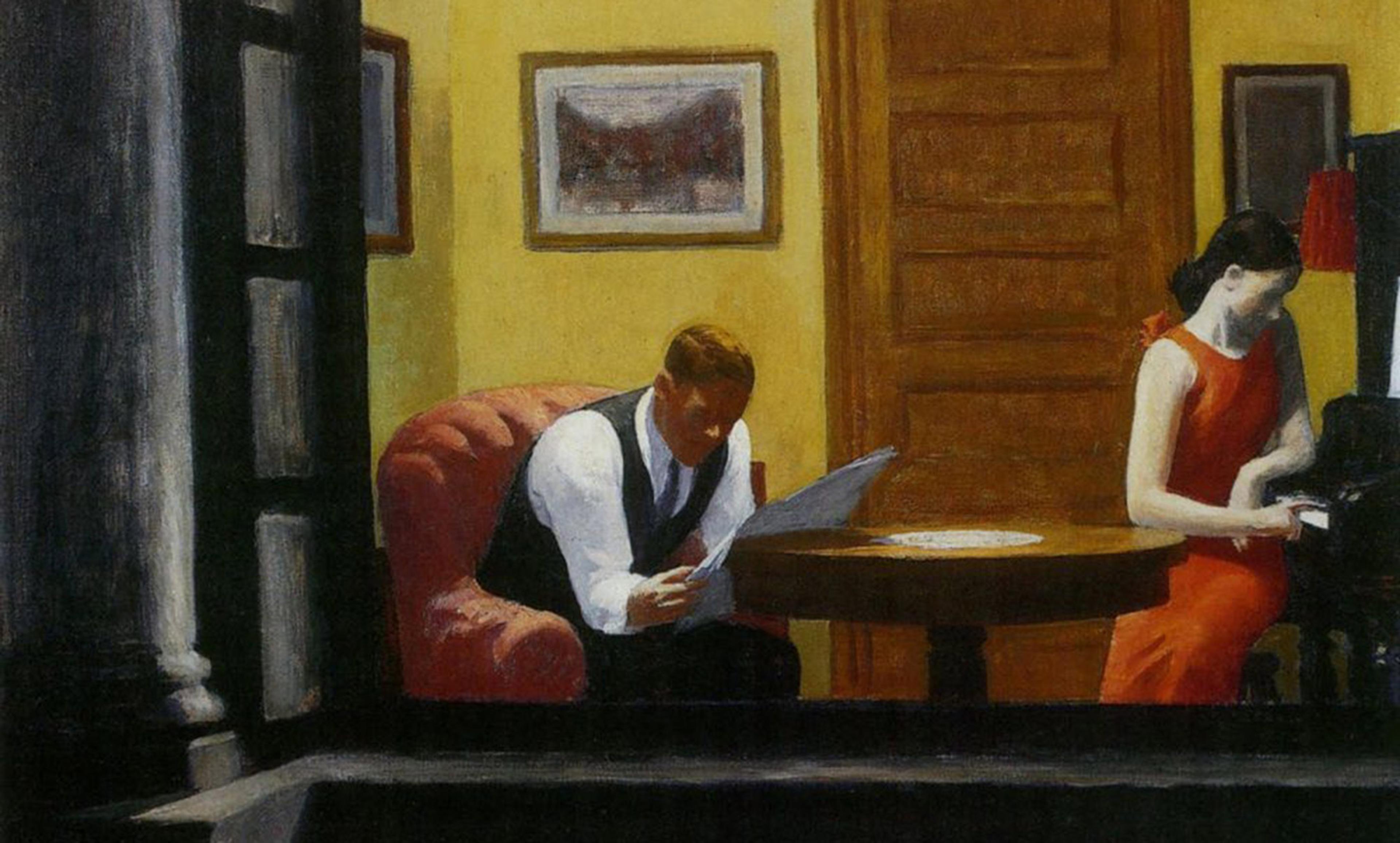
Room in New York (1932) by Edward Hopper. Photo courtesy Wikimedia
by Pilar Lopez-Cantero + BIO

Imagine two couples, each at home for dinner. The first couple spends the whole meal caressing each other’s hair, calling each other cheesy monikers and, after the meal is finished, holding hands across the table, staring affectionately into each other’s eyes. Before long, they are in bed together. The other couple eats quietly, barely talking and, when the meal is through, they load the dishwasher. Later, they sit in the same room, but apart, both reading.
Both couples are in love. They just express it differently. The philosopher Karen Jones at the University of Melbourne has an important insight into what is going on here. Love is what she calls an interpretation-sensitive trajectory . Trajectories are processes. One isn’t really in love for a fleeting moment, in the same way that one doesn’t have a profession or a hobby for a fleeting moment. The fact that an episode counts as love for a certain person – like another episode counts for a certain person being a writer or a knitter – depends on things that have happened before, or will happen after, that episode.
In that sense, love is a process, not an episode. Each action fits within an ongoing narrative, and that is how it gets its meaning. The same action performed in a different narrative could have a radically different meaning. For instance, for the first couple, the idea of sitting apart from each other reading might be the opposite of an expression of love – it might signify that the relationship has broken down. Meanwhile, for the second couple, this could be their perfect understanding of how they want to be together that evening.
We jointly write our stories of love and give meaning to our actions within these narratives.
In a narrative, specific events make sense in light of each other. Sitting down with your partner reading in silence might make sense as part of your romantic relationship in light of other events, such as having lived together for years or sharing your respective passion for books. More importantly, it makes sense as an episode of love for your partner because of how you have conceptualised your relationship, which is, in a sense, unique to you both. That is why reading a novel in silence with your partner can be an expression of your love, while reading a legal document in silence next to your colleague is not (unless your colleague also happens to be your romantic partner, and you have a second narrative of love interwoven with your work narrative).
This makes things sound simple. But they’re not. In any relationship, we will be subject to several different levels of narrative running simultaneously, and also the possibility that what we assume to be a shared conception might not be so. Typically, we each arrive at our individual conceptualisation of romantic love through three levels of narrative. The philosopher Hilde Lindemann at Michigan State University points to the existence of socially shared narratives that are associated with certain practices. In Holding and Letting Go (2014), she explains , for example, that pregnancy is associated with eating certain foods, posting on social media or reading parenting books. All these are expected events in a pregnancy narrative, which is partly shaped socially.
Equally, there are certain practices conventionally associated with the narrative of love that we accumulate from our culture – often from popular culture. These might include the Romeo and Juliet trope, or the Disney princess story, or the tug between duty and romantic love. Think of the nostalgia for moments of bliss together captured in Humphrey Bogart’s line in the film Casablanca (1942): ‘We’ll always have Paris.’ These and other stories contribute to shaping our conceptualisation of love when we move from fiction to reality. We also have our own specific relationship narratives, which are types of we-narratives , in the words of the philosophers Deborah Tollefsen and Shaun Gallagher at the University of Memphis in 2017. In the case of a romantic partnership, that ‘we’ refers specifically to the people involved in the relationship. Each romantic partnership has a unique we-narrative that is both shaped by and the shaper of the relationship. For example, the backstory of ‘how we met’ can shape how people define their romantic relationships. Certain practices, such as the degree of expected physical affection, become episodes that become habits and expectations that make sense as part of some relationships and not others, given that different people have different we-narratives.
Finally, we have our individual narratives . Most of us are or will be in more than one romantic relationship over our lifetimes, and those different we-narratives too become blueprints for our definition of what gets counted as love and what does not. They shape our expectations, but can also act as exemplars of the we-narratives we hope for, or perhaps explicitly want to avoid.
From this amalgamation, we get a personal interpretative framework that defines which actions, for each of us, count as loving. We understand what it is to be in love through the cultural and personal stories we enact. People who live in the same societies are exposed to similar cultural stories; they tend to have life arcs that bear a great deal of resemblance to each other (growing up, getting a career, searching for fulfilment through a reciprocal ongoing romantic relationship, or more than one). Yet there is room for individual differences too, and they can be the source of misunderstanding, tensions and disappointment – for example, when a partner expects more physical expression of love, or less, than you wish to give; or when a narrative clashes with a partner’s expectations of both romantic and emotional exclusivity. Where partners have narratives that produce very different expectations, disappointment and resentment are almost inevitable.
In love, there are no easy guidelines. But perhaps, by coming to recognise the degree to which overlapping and different narratives shape our expectations in love, we can avoid some of the worst outcomes. Perhaps, too, we have a philosophical duty to interrogate the extent to which our narratives are shaped by crass romantic clichés from songs, movies and sitcoms – even if we wrongly believe ourselves above them. However, it won’t suffice to recognise that we’re all entangled in complex webs of romantic narrative. We also need to make sure that we are truly co-authoring our we-narratives. The people we love are not just characters, but also creators, of our shared story. To love each other better, we should respect this. The world is unlikely to furnish us with a perfectly matched storyteller, but love won’t flourish if each of us is trying to tell a different story.

Gentle medicine could radically transform medical practice
Jacob Stegenga
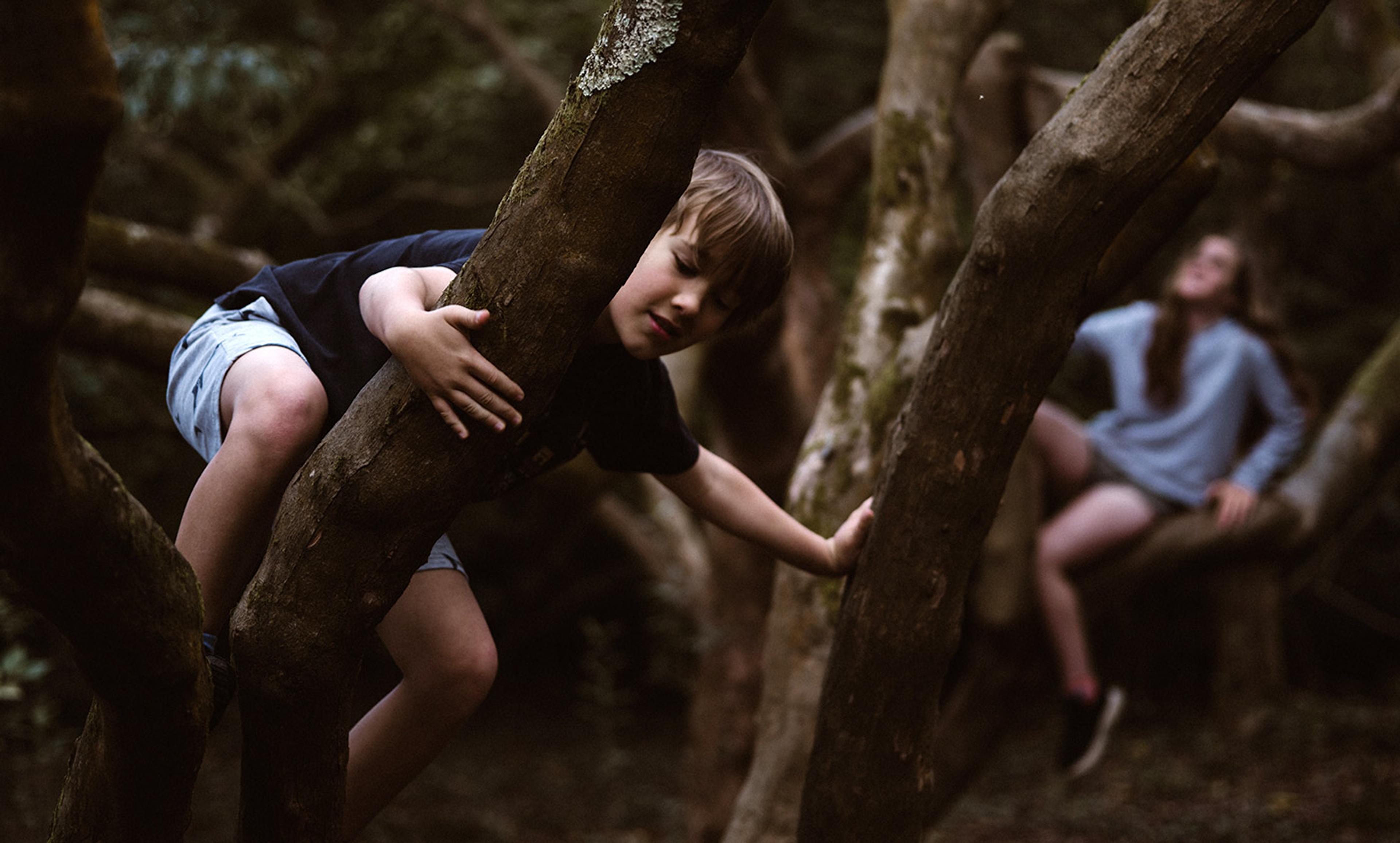
Childhood and adolescence
For a child, being carefree is intrinsic to a well-lived life
Luara Ferracioli
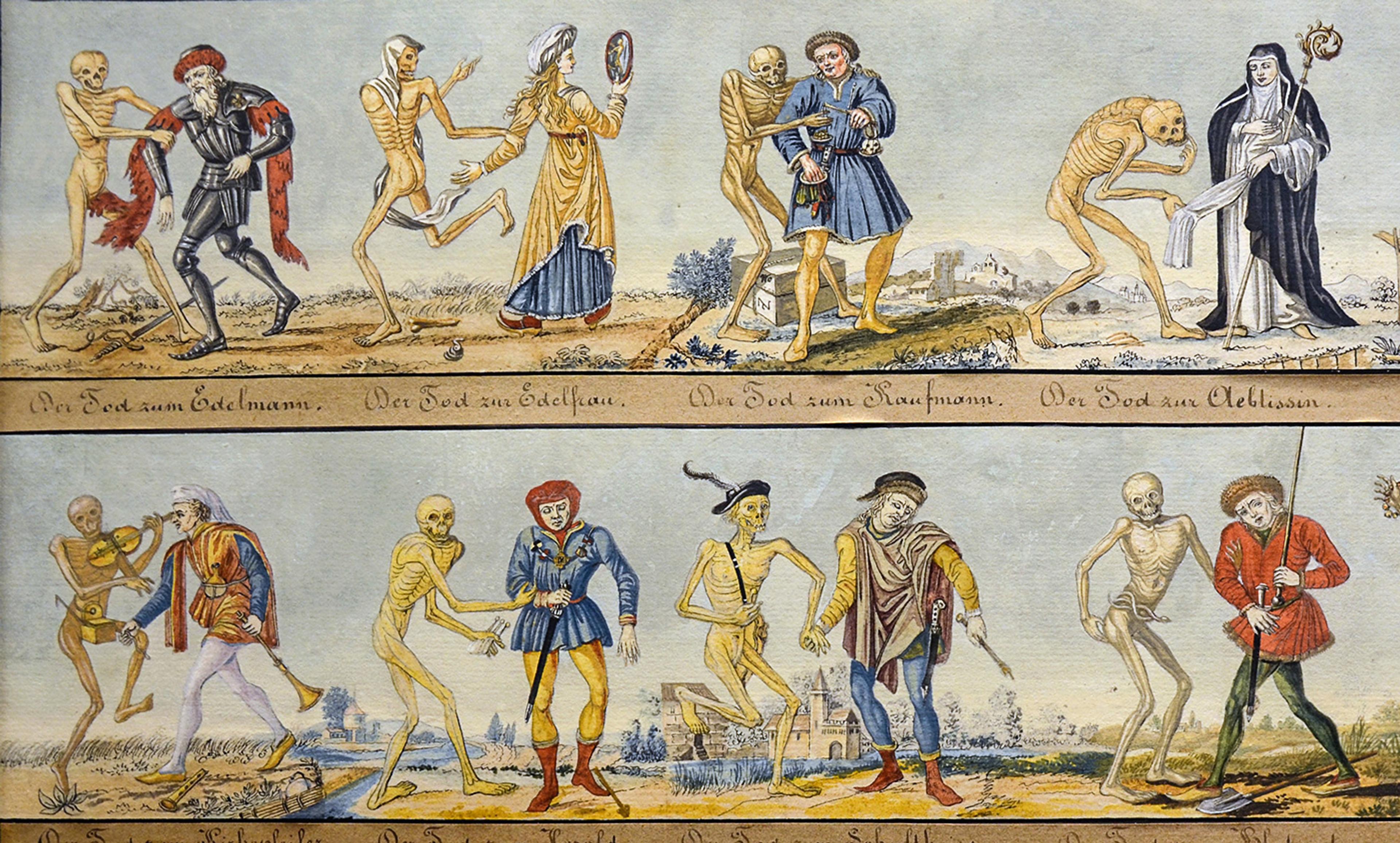
Meaning and the good life
Sooner or later we all face death. Will a sense of meaning help us?
Warren Ward

Philosophy of mind
Think of mental disorders as the mind’s ‘sticky tendencies’
Kristopher Nielsen

Philosophy cannot resolve the question ‘How should we live?’
David Ellis

Rituals and celebrations
We need highly formal rituals in order to make life more democratic
Antone Martinho-Truswell

Choose Your Test
Sat / act prep online guides and tips, 3 great narrative essay examples + tips for writing.
General Education

A narrative essay is one of the most intimidating assignments you can be handed at any level of your education. Where you've previously written argumentative essays that make a point or analytic essays that dissect meaning, a narrative essay asks you to write what is effectively a story .
But unlike a simple work of creative fiction, your narrative essay must have a clear and concrete motif —a recurring theme or idea that you’ll explore throughout. Narrative essays are less rigid, more creative in expression, and therefore pretty different from most other essays you’ll be writing.
But not to fear—in this article, we’ll be covering what a narrative essay is, how to write a good one, and also analyzing some personal narrative essay examples to show you what a great one looks like.
What Is a Narrative Essay?
At first glance, a narrative essay might sound like you’re just writing a story. Like the stories you're used to reading, a narrative essay is generally (but not always) chronological, following a clear throughline from beginning to end. Even if the story jumps around in time, all the details will come back to one specific theme, demonstrated through your choice in motifs.
Unlike many creative stories, however, your narrative essay should be based in fact. That doesn’t mean that every detail needs to be pure and untainted by imagination, but rather that you shouldn’t wholly invent the events of your narrative essay. There’s nothing wrong with inventing a person’s words if you can’t remember them exactly, but you shouldn’t say they said something they weren’t even close to saying.
Another big difference between narrative essays and creative fiction—as well as other kinds of essays—is that narrative essays are based on motifs. A motif is a dominant idea or theme, one that you establish before writing the essay. As you’re crafting the narrative, it’ll feed back into your motif to create a comprehensive picture of whatever that motif is.
For example, say you want to write a narrative essay about how your first day in high school helped you establish your identity. You might discuss events like trying to figure out where to sit in the cafeteria, having to describe yourself in five words as an icebreaker in your math class, or being unsure what to do during your lunch break because it’s no longer acceptable to go outside and play during lunch. All of those ideas feed back into the central motif of establishing your identity.
The important thing to remember is that while a narrative essay is typically told chronologically and intended to read like a story, it is not purely for entertainment value. A narrative essay delivers its theme by deliberately weaving the motifs through the events, scenes, and details. While a narrative essay may be entertaining, its primary purpose is to tell a complete story based on a central meaning.
Unlike other essay forms, it is totally okay—even expected—to use first-person narration in narrative essays. If you’re writing a story about yourself, it’s natural to refer to yourself within the essay. It’s also okay to use other perspectives, such as third- or even second-person, but that should only be done if it better serves your motif. Generally speaking, your narrative essay should be in first-person perspective.
Though your motif choices may feel at times like you’re making a point the way you would in an argumentative essay, a narrative essay’s goal is to tell a story, not convince the reader of anything. Your reader should be able to tell what your motif is from reading, but you don’t have to change their mind about anything. If they don’t understand the point you are making, you should consider strengthening the delivery of the events and descriptions that support your motif.
Narrative essays also share some features with analytical essays, in which you derive meaning from a book, film, or other media. But narrative essays work differently—you’re not trying to draw meaning from an existing text, but rather using an event you’ve experienced to convey meaning. In an analytical essay, you examine narrative, whereas in a narrative essay you create narrative.
The structure of a narrative essay is also a bit different than other essays. You’ll generally be getting your point across chronologically as opposed to grouping together specific arguments in paragraphs or sections. To return to the example of an essay discussing your first day of high school and how it impacted the shaping of your identity, it would be weird to put the events out of order, even if not knowing what to do after lunch feels like a stronger idea than choosing where to sit. Instead of organizing to deliver your information based on maximum impact, you’ll be telling your story as it happened, using concrete details to reinforce your theme.

3 Great Narrative Essay Examples
One of the best ways to learn how to write a narrative essay is to look at a great narrative essay sample. Let’s take a look at some truly stellar narrative essay examples and dive into what exactly makes them work so well.
A Ticket to the Fair by David Foster Wallace
Today is Press Day at the Illinois State Fair in Springfield, and I’m supposed to be at the fairgrounds by 9:00 A.M. to get my credentials. I imagine credentials to be a small white card in the band of a fedora. I’ve never been considered press before. My real interest in credentials is getting into rides and shows for free. I’m fresh in from the East Coast, for an East Coast magazine. Why exactly they’re interested in the Illinois State Fair remains unclear to me. I suspect that every so often editors at East Coast magazines slap their foreheads and remember that about 90 percent of the United States lies between the coasts, and figure they’ll engage somebody to do pith-helmeted anthropological reporting on something rural and heartlandish. I think they asked me to do this because I grew up here, just a couple hours’ drive from downstate Springfield. I never did go to the state fair, though—I pretty much topped out at the county fair level. Actually, I haven’t been back to Illinois for a long time, and I can’t say I’ve missed it.
Throughout this essay, David Foster Wallace recounts his experience as press at the Illinois State Fair. But it’s clear from this opening that he’s not just reporting on the events exactly as they happened—though that’s also true— but rather making a point about how the East Coast, where he lives and works, thinks about the Midwest.
In his opening paragraph, Wallace states that outright: “Why exactly they’re interested in the Illinois State Fair remains unclear to me. I suspect that every so often editors at East Coast magazines slap their foreheads and remember that about 90 percent of the United States lies between the coasts, and figure they’ll engage somebody to do pith-helmeted anthropological reporting on something rural and heartlandish.”
Not every motif needs to be stated this clearly , but in an essay as long as Wallace’s, particularly since the audience for such a piece may feel similarly and forget that such a large portion of the country exists, it’s important to make that point clear.
But Wallace doesn’t just rest on introducing his motif and telling the events exactly as they occurred from there. It’s clear that he selects events that remind us of that idea of East Coast cynicism , such as when he realizes that the Help Me Grow tent is standing on top of fake grass that is killing the real grass beneath, when he realizes the hypocrisy of craving a corn dog when faced with a real, suffering pig, when he’s upset for his friend even though he’s not the one being sexually harassed, and when he witnesses another East Coast person doing something he wouldn’t dare to do.
Wallace is literally telling the audience exactly what happened, complete with dates and timestamps for when each event occurred. But he’s also choosing those events with a purpose—he doesn’t focus on details that don’t serve his motif. That’s why he discusses the experiences of people, how the smells are unappealing to him, and how all the people he meets, in cowboy hats, overalls, or “black spandex that looks like cheesecake leotards,” feel almost alien to him.
All of these details feed back into the throughline of East Coast thinking that Wallace introduces in the first paragraph. He also refers back to it in the essay’s final paragraph, stating:
At last, an overarching theory blooms inside my head: megalopolitan East Coasters’ summer treats and breaks and literally ‘getaways,’ flights-from—from crowds, noise, heat, dirt, the stress of too many sensory choices….The East Coast existential treat is escape from confines and stimuli—quiet, rustic vistas that hold still, turn inward, turn away. Not so in the rural Midwest. Here you’re pretty much away all the time….Something in a Midwesterner sort of actuates , deep down, at a public event….The real spectacle that draws us here is us.
Throughout this journey, Wallace has tried to demonstrate how the East Coast thinks about the Midwest, ultimately concluding that they are captivated by the Midwest’s less stimuli-filled life, but that the real reason they are interested in events like the Illinois State Fair is that they are, in some ways, a means of looking at the East Coast in a new, estranging way.
The reason this works so well is that Wallace has carefully chosen his examples, outlined his motif and themes in the first paragraph, and eventually circled back to the original motif with a clearer understanding of his original point.
When outlining your own narrative essay, try to do the same. Start with a theme, build upon it with examples, and return to it in the end with an even deeper understanding of the original issue. You don’t need this much space to explore a theme, either—as we’ll see in the next example, a strong narrative essay can also be very short.

Death of a Moth by Virginia Woolf
After a time, tired by his dancing apparently, he settled on the window ledge in the sun, and, the queer spectacle being at an end, I forgot about him. Then, looking up, my eye was caught by him. He was trying to resume his dancing, but seemed either so stiff or so awkward that he could only flutter to the bottom of the window-pane; and when he tried to fly across it he failed. Being intent on other matters I watched these futile attempts for a time without thinking, unconsciously waiting for him to resume his flight, as one waits for a machine, that has stopped momentarily, to start again without considering the reason of its failure. After perhaps a seventh attempt he slipped from the wooden ledge and fell, fluttering his wings, on to his back on the window sill. The helplessness of his attitude roused me. It flashed upon me that he was in difficulties; he could no longer raise himself; his legs struggled vainly. But, as I stretched out a pencil, meaning to help him to right himself, it came over me that the failure and awkwardness were the approach of death. I laid the pencil down again.
In this essay, Virginia Woolf explains her encounter with a dying moth. On surface level, this essay is just a recounting of an afternoon in which she watched a moth die—it’s even established in the title. But there’s more to it than that. Though Woolf does not begin her essay with as clear a motif as Wallace, it’s not hard to pick out the evidence she uses to support her point, which is that the experience of this moth is also the human experience.
In the title, Woolf tells us this essay is about death. But in the first paragraph, she seems to mostly be discussing life—the moth is “content with life,” people are working in the fields, and birds are flying. However, she mentions that it is mid-September and that the fields were being plowed. It’s autumn and it’s time for the harvest; the time of year in which many things die.
In this short essay, she chronicles the experience of watching a moth seemingly embody life, then die. Though this essay is literally about a moth, it’s also about a whole lot more than that. After all, moths aren’t the only things that die—Woolf is also reflecting on her own mortality, as well as the mortality of everything around her.
At its core, the essay discusses the push and pull of life and death, not in a way that’s necessarily sad, but in a way that is accepting of both. Woolf begins by setting up the transitional fall season, often associated with things coming to an end, and raises the ideas of pleasure, vitality, and pity.
At one point, Woolf tries to help the dying moth, but reconsiders, as it would interfere with the natural order of the world. The moth’s death is part of the natural order of the world, just like fall, just like her own eventual death.
All these themes are set up in the beginning and explored throughout the essay’s narrative. Though Woolf doesn’t directly state her theme, she reinforces it by choosing a small, isolated event—watching a moth die—and illustrating her point through details.
With this essay, we can see that you don’t need a big, weird, exciting event to discuss an important meaning. Woolf is able to explore complicated ideas in a short essay by being deliberate about what details she includes, just as you can be in your own essays.

Notes of a Native Son by James Baldwin
On the twenty-ninth of July, in 1943, my father died. On the same day, a few hours later, his last child was born. Over a month before this, while all our energies were concentrated in waiting for these events, there had been, in Detroit, one of the bloodiest race riots of the century. A few hours after my father’s funeral, while he lay in state in the undertaker’s chapel, a race riot broke out in Harlem. On the morning of the third of August, we drove my father to the graveyard through a wilderness of smashed plate glass.
Like Woolf, Baldwin does not lay out his themes in concrete terms—unlike Wallace, there’s no clear sentence that explains what he’ll be talking about. However, you can see the motifs quite clearly: death, fatherhood, struggle, and race.
Throughout the narrative essay, Baldwin discusses the circumstances of his father’s death, including his complicated relationship with his father. By introducing those motifs in the first paragraph, the reader understands that everything discussed in the essay will come back to those core ideas. When Baldwin talks about his experience with a white teacher taking an interest in him and his father’s resistance to that, he is also talking about race and his father’s death. When he talks about his father’s death, he is also talking about his views on race. When he talks about his encounters with segregation and racism, he is talking, in part, about his father.
Because his father was a hard, uncompromising man, Baldwin struggles to reconcile the knowledge that his father was right about many things with his desire to not let that hardness consume him, as well.
Baldwin doesn’t explicitly state any of this, but his writing so often touches on the same motifs that it becomes clear he wants us to think about all these ideas in conversation with one another.
At the end of the essay, Baldwin makes it more clear:
This fight begins, however, in the heart and it had now been laid to my charge to keep my own heart free of hatred and despair. This intimation made my heart heavy and, now that my father was irrecoverable, I wished that he had been beside me so that I could have searched his face for the answers which only the future would give me now.
Here, Baldwin ties together the themes and motifs into one clear statement: that he must continue to fight and recognize injustice, especially racial injustice, just as his father did. But unlike his father, he must do it beginning with himself—he must not let himself be closed off to the world as his father was. And yet, he still wishes he had his father for guidance, even as he establishes that he hopes to be a different man than his father.
In this essay, Baldwin loads the front of the essay with his motifs, and, through his narrative, weaves them together into a theme. In the end, he comes to a conclusion that connects all of those things together and leaves the reader with a lasting impression of completion—though the elements may have been initially disparate, in the end everything makes sense.
You can replicate this tactic of introducing seemingly unattached ideas and weaving them together in your own essays. By introducing those motifs, developing them throughout, and bringing them together in the end, you can demonstrate to your reader how all of them are related. However, it’s especially important to be sure that your motifs and clear and consistent throughout your essay so that the conclusion feels earned and consistent—if not, readers may feel mislead.
5 Key Tips for Writing Narrative Essays
Narrative essays can be a lot of fun to write since they’re so heavily based on creativity. But that can also feel intimidating—sometimes it’s easier to have strict guidelines than to have to make it all up yourself. Here are a few tips to keep your narrative essay feeling strong and fresh.
Develop Strong Motifs
Motifs are the foundation of a narrative essay . What are you trying to say? How can you say that using specific symbols or events? Those are your motifs.
In the same way that an argumentative essay’s body should support its thesis, the body of your narrative essay should include motifs that support your theme.
Try to avoid cliches, as these will feel tired to your readers. Instead of roses to symbolize love, try succulents. Instead of the ocean representing some vast, unknowable truth, try the depths of your brother’s bedroom. Keep your language and motifs fresh and your essay will be even stronger!
Use First-Person Perspective
In many essays, you’re expected to remove yourself so that your points stand on their own. Not so in a narrative essay—in this case, you want to make use of your own perspective.
Sometimes a different perspective can make your point even stronger. If you want someone to identify with your point of view, it may be tempting to choose a second-person perspective. However, be sure you really understand the function of second-person; it’s very easy to put a reader off if the narration isn’t expertly deployed.
If you want a little bit of distance, third-person perspective may be okay. But be careful—too much distance and your reader may feel like the narrative lacks truth.
That’s why first-person perspective is the standard. It keeps you, the writer, close to the narrative, reminding the reader that it really happened. And because you really know what happened and how, you’re free to inject your own opinion into the story without it detracting from your point, as it would in a different type of essay.
Stick to the Truth
Your essay should be true. However, this is a creative essay, and it’s okay to embellish a little. Rarely in life do we experience anything with a clear, concrete meaning the way somebody in a book might. If you flub the details a little, it’s okay—just don’t make them up entirely.
Also, nobody expects you to perfectly recall details that may have happened years ago. You may have to reconstruct dialog from your memory and your imagination. That’s okay, again, as long as you aren’t making it up entirely and assigning made-up statements to somebody.
Dialog is a powerful tool. A good conversation can add flavor and interest to a story, as we saw demonstrated in David Foster Wallace’s essay. As previously mentioned, it’s okay to flub it a little, especially because you’re likely writing about an experience you had without knowing that you’d be writing about it later.
However, don’t rely too much on it. Your narrative essay shouldn’t be told through people explaining things to one another; the motif comes through in the details. Dialog can be one of those details, but it shouldn’t be the only one.
Use Sensory Descriptions
Because a narrative essay is a story, you can use sensory details to make your writing more interesting. If you’re describing a particular experience, you can go into detail about things like taste, smell, and hearing in a way that you probably wouldn’t do in any other essay style.
These details can tie into your overall motifs and further your point. Woolf describes in great detail what she sees while watching the moth, giving us the sense that we, too, are watching the moth. In Wallace’s essay, he discusses the sights, sounds, and smells of the Illinois State Fair to help emphasize his point about its strangeness. And in Baldwin’s essay, he describes shattered glass as a “wilderness,” and uses the feelings of his body to describe his mental state.
All these descriptions anchor us not only in the story, but in the motifs and themes as well. One of the tools of a writer is making the reader feel as you felt, and sensory details help you achieve that.
What’s Next?
Looking to brush up on your essay-writing capabilities before the ACT? This guide to ACT English will walk you through some of the best strategies and practice questions to get you prepared!
Part of practicing for the ACT is ensuring your word choice and diction are on point. Check out this guide to some of the most common errors on the ACT English section to be sure that you're not making these common mistakes!
A solid understanding of English principles will help you make an effective point in a narrative essay, and you can get that understanding through taking a rigorous assortment of high school English classes !

Melissa Brinks graduated from the University of Washington in 2014 with a Bachelor's in English with a creative writing emphasis. She has spent several years tutoring K-12 students in many subjects, including in SAT prep, to help them prepare for their college education.
Ask a Question Below
Have any questions about this article or other topics? Ask below and we'll reply!
Improve With Our Famous Guides
- For All Students
The 5 Strategies You Must Be Using to Improve 160+ SAT Points
How to Get a Perfect 1600, by a Perfect Scorer
Series: How to Get 800 on Each SAT Section:
Score 800 on SAT Math
Score 800 on SAT Reading
Score 800 on SAT Writing
Series: How to Get to 600 on Each SAT Section:
Score 600 on SAT Math
Score 600 on SAT Reading
Score 600 on SAT Writing
Free Complete Official SAT Practice Tests
What SAT Target Score Should You Be Aiming For?
15 Strategies to Improve Your SAT Essay
The 5 Strategies You Must Be Using to Improve 4+ ACT Points
How to Get a Perfect 36 ACT, by a Perfect Scorer
Series: How to Get 36 on Each ACT Section:
36 on ACT English
36 on ACT Math
36 on ACT Reading
36 on ACT Science
Series: How to Get to 24 on Each ACT Section:
24 on ACT English
24 on ACT Math
24 on ACT Reading
24 on ACT Science
What ACT target score should you be aiming for?
ACT Vocabulary You Must Know
ACT Writing: 15 Tips to Raise Your Essay Score
How to Get Into Harvard and the Ivy League
How to Get a Perfect 4.0 GPA
How to Write an Amazing College Essay
What Exactly Are Colleges Looking For?
Is the ACT easier than the SAT? A Comprehensive Guide
Should you retake your SAT or ACT?
When should you take the SAT or ACT?
Stay Informed
Get the latest articles and test prep tips!
Looking for Graduate School Test Prep?
Check out our top-rated graduate blogs here:
GRE Online Prep Blog
GMAT Online Prep Blog
TOEFL Online Prep Blog
Holly R. "I am absolutely overjoyed and cannot thank you enough for helping me!”
- Grades 6-12
- School Leaders
Enter Today's Teacher Appreciation Giveaway!
15 Inspiring Personal Narrative Examples for Writers
Reveal a part of yourself in your essay.
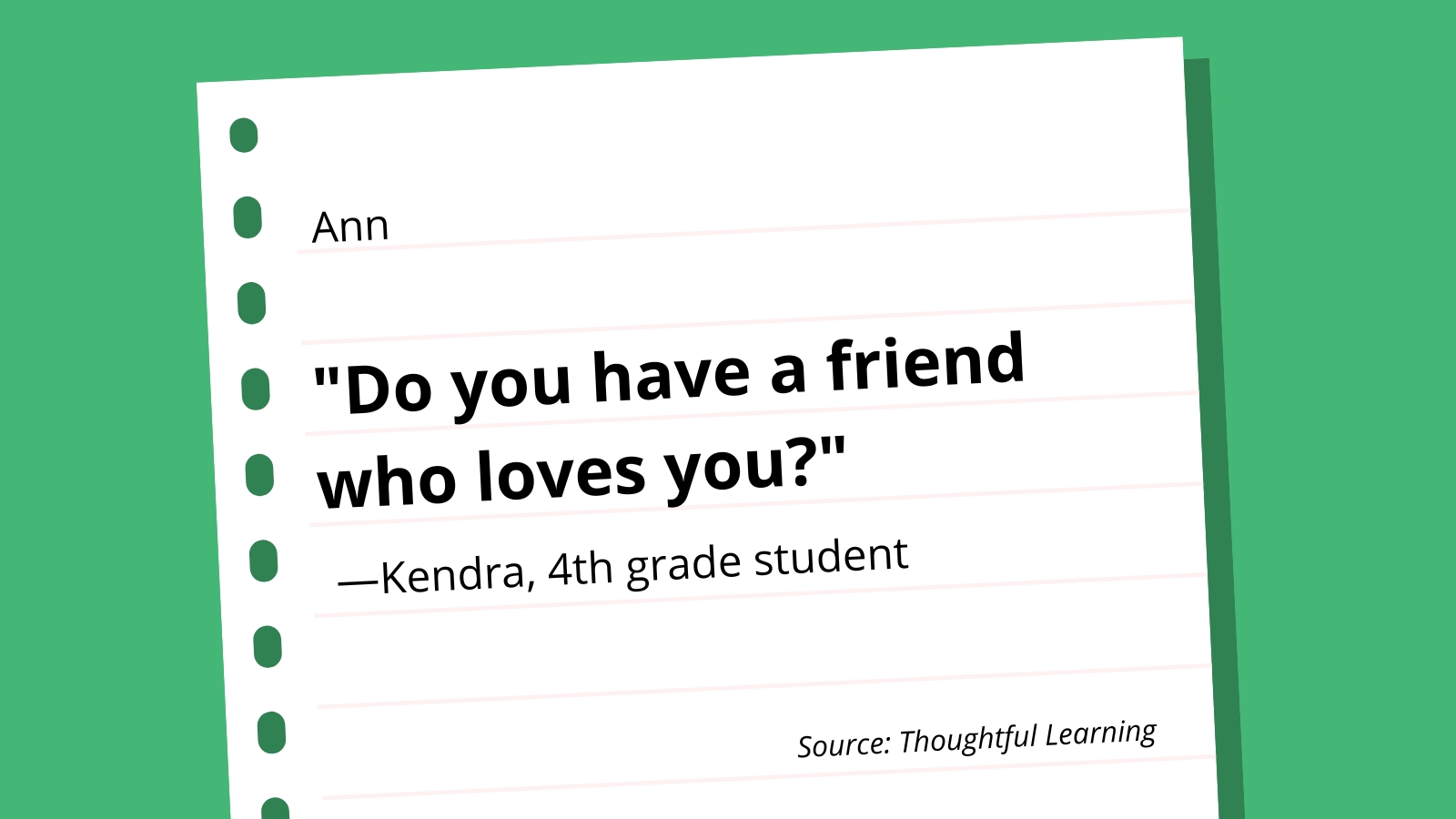
Students start writing personal narratives at a young age, learning to use descriptive language to tell a story about their own experiences. Try sharing these personal narrative examples for elementary, middle, and high school to help them understand this essay form.
What is a personal narrative?
Think of a narrative essay like telling a story. Use descriptive language, and be sure you have a beginning, middle, and end. The essay should recount your personal experiences, including your thoughts, feelings, and actions.
Learn more about personal narrative essays here:
- What Is Narrative Writing, and How Do I Teach It in the Classroom?
- Engaging Personal Narrative Ideas for Kids and Teens
- Best Mentor Texts for Narrative Writing in Elementary School
Elementary School Personal Narrative Examples
In elementary school, personal narratives might be quite short, just a paragraph or two. The key is to encourage kids to embrace a personal style of writing, one that speaks in their own voice. Take a look at these elementary school personal narrative essay examples for inspiration.
The Horrible Day
“next i fell asleep in my cereal and my brother stole my toast”—anonymous student.
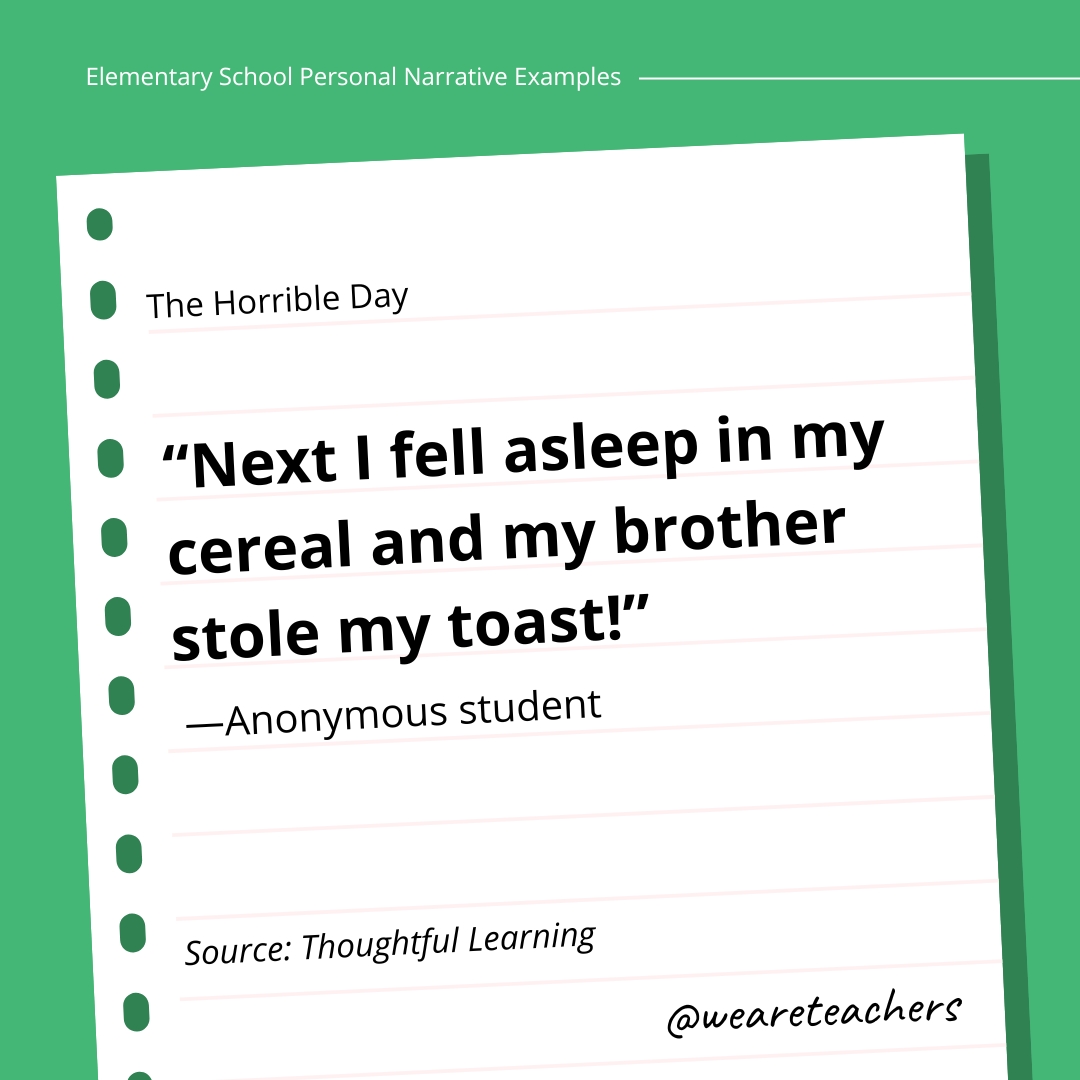
In this short personal narrative written by a 2nd grader, the author describes a bad day with lots of details and an informal tone. It’s a great model for your youngest writers.
Read the full essay: The Horrible Day at Thoughtful Learning

Keep an Eye on the Sky!
“as we made our way out to the field, my stomach slowly turned into a giant knot of fear.” —anonymous student.
Any student who dreads gym class will connect with this essay, which turns a challenge into a triumph. This narrative from Time for Kids is annotated, with highlighted details and tips to help kids write their own essay.
Read the full essay: Keep an Eye on the Sky! at Time for Kids
Grandpa, Chaz, and Me
“i really miss grandpa, and so does my brother, even though he never met him.” —cody, 4th grade student.
Written by a 4th grader, this essay relates the author’s loss of a grandfather at a very young age. Using simple, personal language, they tell a compelling story in a few short paragraphs.
Read the full essay: Grandpa, Chaz, and Me at Thoughtful Learning
Surviving an Embarrassing Situation
“i had made the shot in the wrong basket, giving the green shirts the win” —anonymous student.
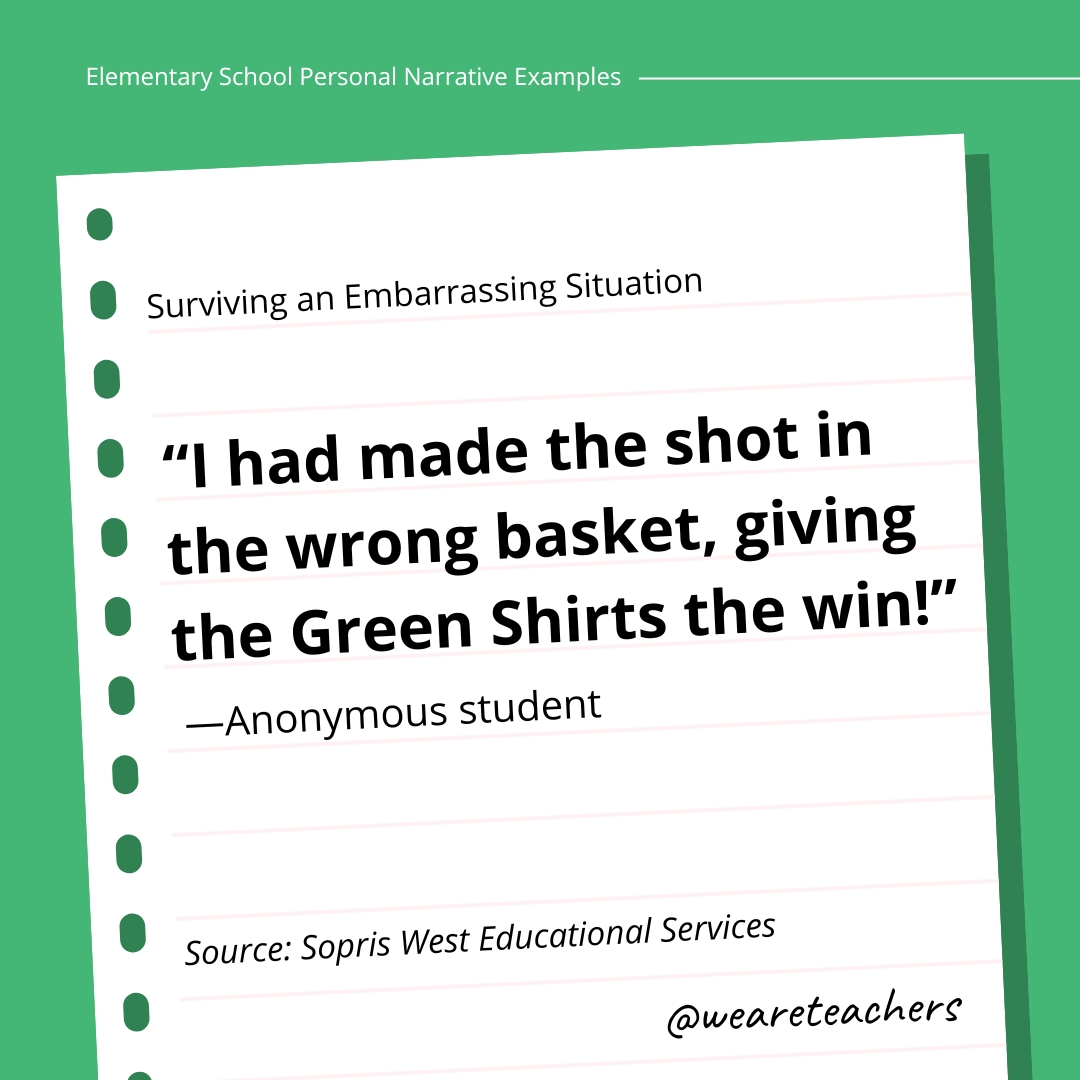
Personal narratives tell a story, with a beginning, middle, and end. This annotated essay outlines those parts, making it easier for young writers to do the same in their own writing.
Read the full essay: Surviving an Embarrassing Situation at Sopris West Educational Services
“Do you have a friend who loves you?” —Kendra, 4th grade student
Writing about friends gives writers the chance to describe someone’s physical characteristics and personality. This 4th grade essay uses personal details to bring a beloved friend to life.
Read the full essay: Ann at Thoughtful Learning
Middle School Personal Narrative Examples
By middle school, personal narratives are longer and more involved, telling more detailed stories and experiences. These middle school personal narrative essay examples model strong writing skills for this age group.
“As thoughts of certain death run through my mind, the world appears a precious, treasured place.” —Amy, student
Describing an opportunity to overcome your worst fears makes an excellent personal narrative topic. The vivid descriptions of the landscape and the author’s feelings help the reader make a strong connection to the author.
Read the full essay: The Climb at Thoughtful Learning
The Best Friend Question
“i’ve often wondered, does not having a best friend make me defective” —blanche li, age 13, diablo vista middle school, danville, california.
When her Spanish teacher asked students for an essay describing their best friend, 13-year-old Blanche Li fell back on her standard story: that of a made-up person. Here, she explains why she made up “Haley” and wonders what having an imaginary best friend says about her.
Read the full essay: The Best Friend Question at The New York Times
The Racist Warehouse
“i didn’t know racism was still around; i thought that situation had died along with dr. king.” —alicia, 8th grade student.
Strong personal narratives often relate the way the author learned an important life lesson. Here, an 8th grader describes her first experience with racism, in an essay that will sadly ring true with many readers.
Read the full essay: The Racist Warehouse at Thoughtful Teaching
“For the first time, we realized that we didn’t know how to express our voice, and we always suppressed it.” —Jocelyn C., 7th grade student, Texas
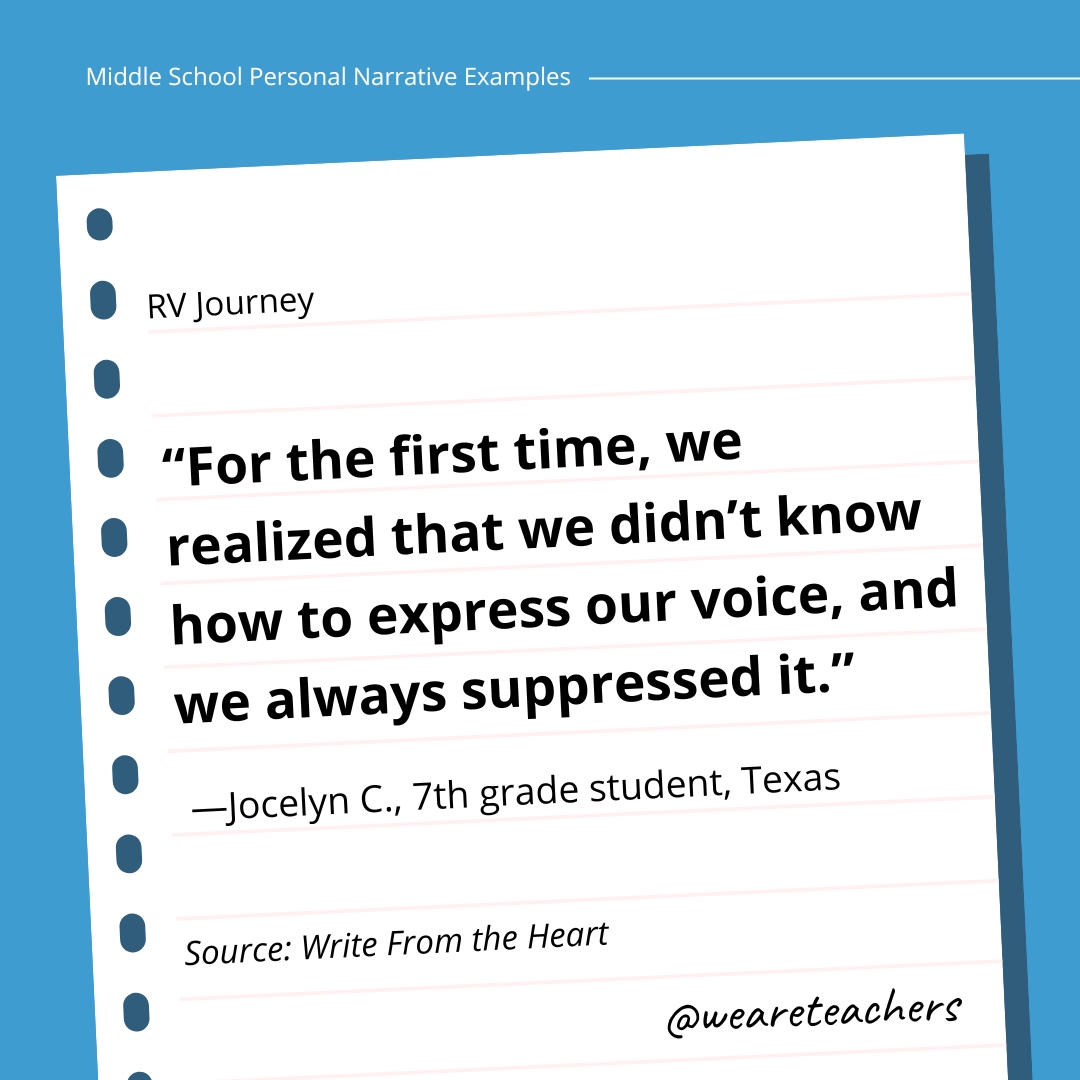
Seventh-grader Jocelyn C. describes the unique experience of spending two years living in an RV with her family, traveling the country. She relates the ups and downs of their trip, illustrating the way her family learned to live together in close quarters and embrace the adventure.
Read the full essay: RV Journey at Write From the Heart
An Eight Pound Rival
“i’m trying to accept that he didn’t mean to dominate the center stage all the time, that’s just one of the many lovable assets of his personality.”.
A new sibling can change everything in a family, especially when you’ve always been the baby. This middle schooler explains her challenging relationship with a little brother that she loves, even when he drives her a bit crazy. (Find this essay on page 42 at the link.)
Read the full essay: An Eight Pound Rival at Teaching That Makes Sense
High School Personal Narrative Examples
High school students have more complex stories to tell, though they’re sometimes reluctant to do so. Reading personal narrative essay examples like these can encourage them to open up and get their thoughts, feelings, and ideas down on the page.
Sorry, Wrong Number
“when i received the first text, i was a playful sixth grader, always finding sly ways to be subversive in school and with friends.” —michelle ahn, high school student.
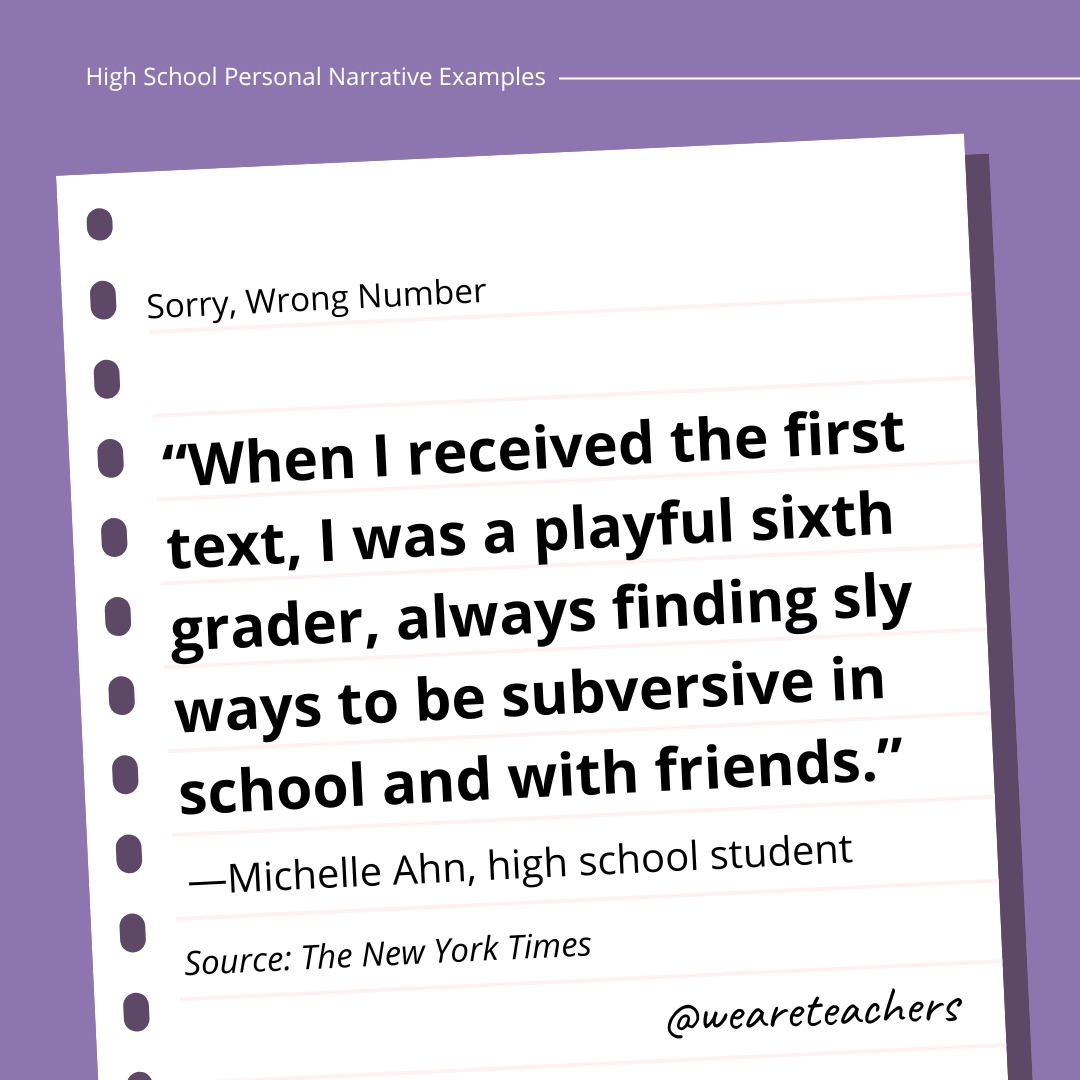
When Michelle Ahn was 11, she started getting texts for a wrong number, a man named Jared. Rather than correcting the error, she spends the next few years occasionally engaging with his texters as “Jared,” learning more about him. Though she finally comes clean, her time as “Jared” exposes her to a way of life very different from her own, and opens her eyes to the inner lives of others.
Read the full essay: Sorry, Wrong Number at The New York Times
Caught in the Net
“little does everyone else know how often i’m not doing school research or paper writing; instead i’m aimlessly writing emails or chatting with internet friends and family hundreds of miles away.” —kim, college student.
Even before social media and smartphones swept the world, internet addiction had become a problem. Here, a student shares her experiences in AOL chat rooms, meeting people from around the globe. Eventually, she realizes she’s sacrificing life in the real world for her digital friends and experiences, and works to find the right balance.
Read the full essay: Caught in the Net at Thoughtful Learning
Nothing Extraordinary
“an uneasy feeling started to settle in my chest. i tried to push it out, but once it took root it refused to be yanked up and tossed away.” —jeniffer kim, high school student.
During an ordinary shopping trip, high schooler Jenniffer Kim suddenly realizes she’s ashamed of her mother. At the same time, she recognizes all the sacrifices her mom has made for her, and gladly takes the chance to make a tiny sacrifice of her own.
Read the full essay: Nothing Extraordinary at The New York Times
The Pot Calling the Kettle Black
“at this point in life, i had not yet learned to be gentle with myself, or others.” —anonymous student.
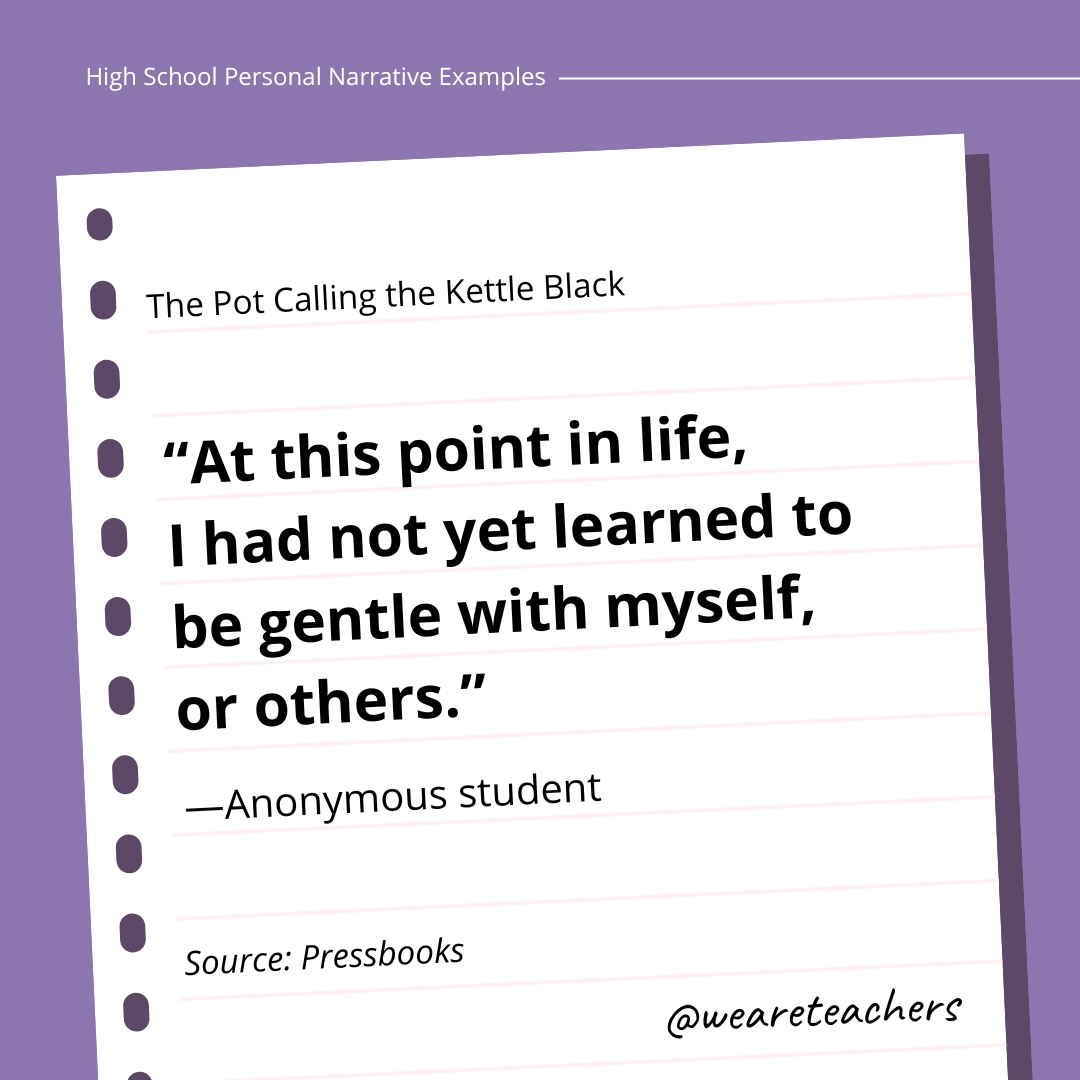
A teen who lives with bipolar disorder recounts a difficult conversation with her parents, in which her mother dismisses her as “crazy.” A few years later, this same teen finds herself in the emergency room, where her mother has just tried to die by suicide. “Crazy!” the daughter thinks. After her mother also receives a bipolar disorder diagnosis, the author concludes, “‘Crazy’ is a term devised to dismiss people.”
Read the full essay: The Pot Calling the Kettle Black at Pressbooks
What a Black Woman Wishes Her Adoptive White Parents Knew
“i know that i am different, but do not have the words to understand how.” —mariama lockington.
Though not written by a high schooler, this essay by Mariama Lockington makes an excellent mentor text for this age group. Lockington dives deep into her feelings about being adopted by parents of a different race, and shares her challenges in poignant language that speaks directly to the reader.
Read the full essay: What a Black Woman Wishes Her Adoptive White Parents Knew at Buzzfeed News
Do you use personal narrative examples as mentor texts in your classroom? Come share your experiences and ask for advice in the We Are Teachers HELPLINE group on Facebook !
Plus, strong persuasive writing examples (essays, speeches, ads, and more) ..
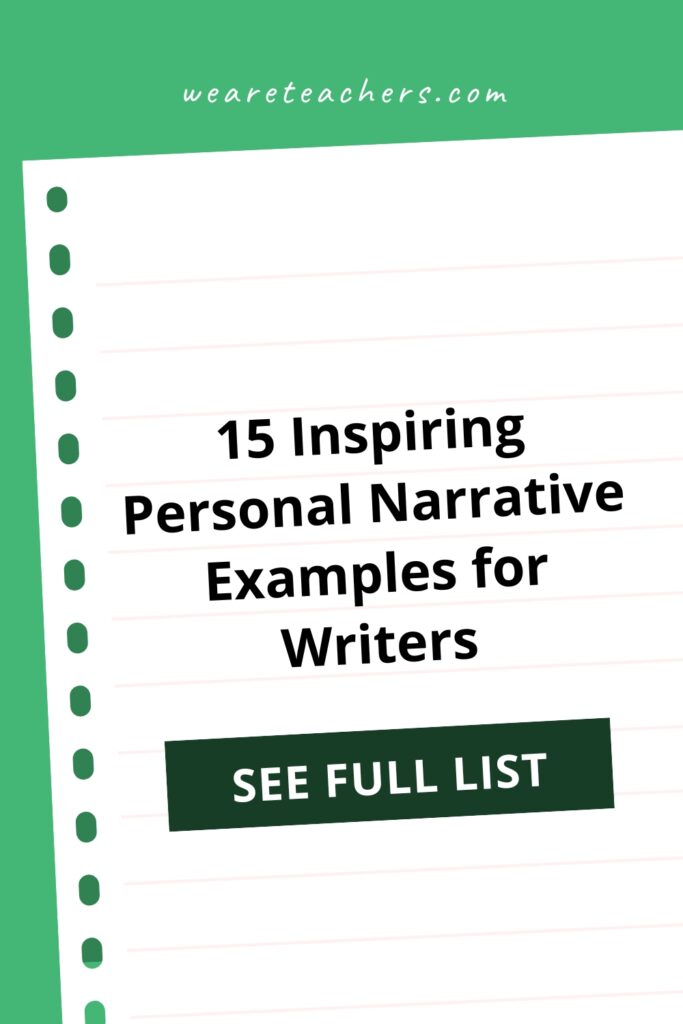
You Might Also Like

65 Engaging Personal Narrative Ideas for Kids and Teens
Tell a story to engage the reader. Continue Reading
Copyright © 2024. All rights reserved. 5335 Gate Parkway, Jacksonville, FL 32256
Home — Essay Types — Personal Narrative Essay
Personal Narrative Essay Examples
In the realm of personal narrative essays, personal narrative essay examples serve as a compelling platform for individuals to share their unique stories, experiences, and perspectives. These essays are more than just pieces of personal history; they are windows into the human condition. However, a key factor in crafting a memorable personal narrative essay lies in selecting the right topic. In this article, we'll delve into the art of choosing personal narrative essay topics and explore their significance in creating a meaningful and engaging narrative.
Finding Ideas for a Personal Narrative Essay
The first step in the journey of crafting a captivating personal narrative essay is finding ideas and inspiration. Inspiration often resides within our own lives and experiences:
- Reflecting on Personal Experiences: Personal narrative essays draw their strength from real-life encounters and observations. Take time to reflect on moments that have left a lasting impact on you.
- Exploring Emotions and Memories: Emotions are the lifeblood of personal narratives. Recall events that stirred powerful emotions within you, whether it was joy, fear, anger, or love.
- Identifying Life-Changing Moments: Sometimes, our most profound stories revolve around events that changed the course of our lives. Identify these turning points and consider how they have shaped you.
By utilizing these ideas for a personal narrative essay, you will unlock a wealth of storytelling potential. Reflecting on personal experiences , exploring emotions and memories, and identifying life-changing moments will enable you to tap into the richness of your own life.
Popular Personal Narrative Essay Ideas and Topics
Now, let's explore some popular personal narrative essay ideas that encompass a wide range of experiences and emotions:
Childhood Memories
- First Day of School : Delve into the nerves, excitement, and anticipation of your very first day of school. What did it teach you about resilience and adaptability?
- A Memorable Family Vacation: Share the details of a family vacation that etched memories into your heart. What made it unforgettable, and how did it shape your bond with your family?
- A Childhood Friendship: Reflect on a cherished childhood friendship. Explore the lessons you learned about trust, loyalty, and the bittersweet passage of time.
Life-changing Experiences
- Overcoming a Fear or Phobia: Narrate an experience where you conquered a deep-seated fear or phobia. What steps did you take, and what did it reveal about your inner strength?
- A Pivotal Life Decision: Share the story of a critical decision that altered the course of your life. What factors weighed on your choice, and what did you gain or lose?
- An Unexpected Adventure: Recount an unexpected adventure that took you out of your comfort zone. What challenges did you face, and how did you grow as a person?
Personal Growth and Reflection
- A Lesson Learned from a Mistake: Explore a mistake you made and the valuable lesson it taught you. How did this experience shape your decision-making and personal growth?
- Achieving a Personal Goal: Celebrate the journey of achieving a personal goal. Reflect on the obstacles you overcame and the determination that fueled your success.
- A Moment of Self-Discovery: Share a moment when you discovered something profound about yourself. How did this newfound self-awareness impact your life and relationships?
Tips for Choosing the Right Topic
When it comes to selecting topics for personal narratives, making the right choice is essential to craft a compelling and meaningful story. Your chosen topic forms the foundation of your narrative, shaping its tone, relevance, and impact on your readers. Selecting the right personal narrative essay topics is crucial. Here are some tips to guide your choice:
- Connecting with Your Audience: Consider your target audience and choose a topic that will resonate with them. Your narrative should evoke emotions and experiences that your readers can relate to.
- The Importance of Authenticity: Authenticity is the key to a compelling personal narrative. Choose a topic that genuinely reflects your experiences and emotions. Readers can sense when a story is authentic.
- Balancing Significance and Relatability: While dramatic events make for engaging narratives, even seemingly small moments can hold immense significance. Balance the significance of the event with its relatability to your audience.
In the realm of personal narrative essays, the choice of topic serves as the foundation upon which the narrative is built. It determines whether your story will resonate with readers and leave a lasting impression. Personal narrative essay examples can illustrate how a well-chosen topic can make your narrative more engaging and relatable. As we conclude this exploration of personal narrative essay topics, remember that your life is a treasure trove of stories waiting to be shared. Whether it's a childhood memory, a life-changing experience, or a moment of self-discovery, the power of your narrative lies in your ability to choose the right topic and let your unique voice shine through. So, embrace your experiences, and embark on a journey of storytelling that captivates, inspires, and connects with others.
Embark on a journey through this writing guide, where personal narrative examples aren’t merely presented; they leap off the page, enveloping us in a world where stories don’t just speak—they roar, resonate, and sometimes, perform a whimsical dance. In this realm, personal narrative examples serve as our guideposts, illuminating the path to crafting narratives that are as authentic as they are compelling.
What is a Personal Narrative Essay Examples
A personal narrative essay is a type of essay that tells a story from the author’s own life experiences and perspectives. It is a form of creative nonfiction in which the author shares a personal story, event, or incident that holds meaning or significance. Personal narrative essays often aim to engage the reader by providing a vivid and emotional account of the author’s experiences.
When crafting a personal narrative essay, it’s essential to find valuable personal narrative essay examples to guide you. This type of writing demands a unique approach, where external research is unnecessary. Draw from your personal experiences and explore your ideas from a personal point of view. The purpose of such essays is to let you work on a certain topic by using analysis and by turning to reflective writing practices.
The examples of personal narrative essays may relate to anything from bullying to the way social media affects our perception of body image in a negative way. Likewise, if you are majoring in Journalism or Political Sciences, you may take any topic that would relate to what you are currently exploring unless you have already been provided with an essay prompt. In either case, you must take your time to focus on your opinion and things that inspire you the most. If you can keep your writing interesting and unique, it will always show as you write.
Comparing personal narrative essays with research essays sheds light on distinct approaches to storytelling and analysis. While personal narrative essays delve into personal experiences and reflections, research essays delve into data-driven analysis and findings. To gain deeper insights into these essay types, explore research essay examples uncovered on our site. Research essays present a systematic examination of a topic, drawing from scholarly sources and empirical evidence, whereas Personal Narrative essays offer subjective accounts of individual experiences. By reviewing examples of both genres, you can discern their unique characteristics and appreciate the diversity of essay writing styles.
Personal narrative essays are a popular form of writing that allow individuals to share their personal experiences, stories, and insights. In the infographics we’ve prepared, you can find a most common types of personal narrative essays:
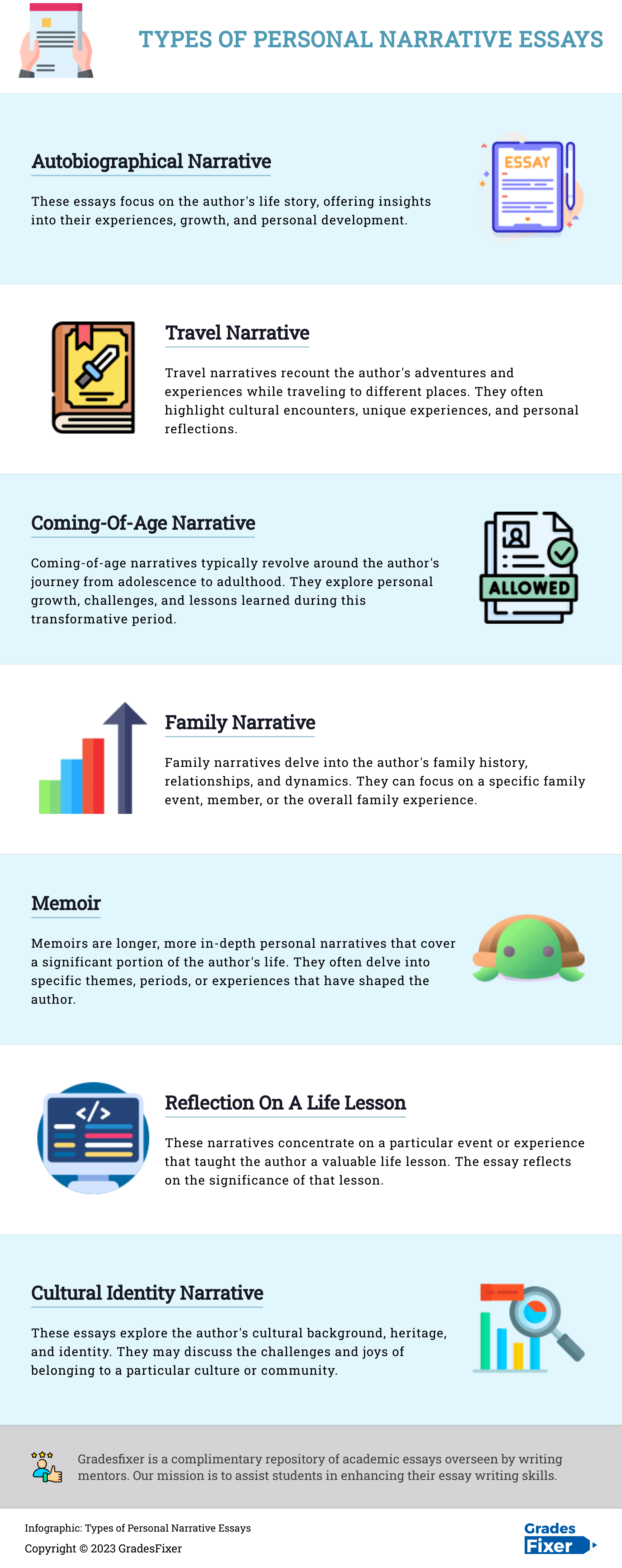
These are some of the most common types of personal narrative essays, each with its unique focus and storytelling approach. The choice of type depends on the author’s personal experiences and the message they want to convey.
How to Write a Personal Narrative Essay
Writing a personal narrative essay is a creative and introspective process that enables you to share a piece of your life with others. If you’re wondering how to write a personal narrative essay, here are 5 key steps to help you get started:
- Choose a Meaningful Experience : Select a personal experience that has had a significant impact on your life. Whether it’s a moment of growth, a life-changing event, or a cherished memory, pick a topic that resonates with you.
- Plan Your Narrative : Create an outline to organize your thoughts. Highlight the main events or moments you want to include and decide on the order in which you’ll present them. This will provide structure to your essay.
- Engage Your Audience : Craft a captivating introduction that immediately grabs the reader’s attention. You can use vivid descriptions, a compelling question, or a thought-provoking quote. Establish the setting and context to draw the reader into your story.
- Tell Your Story : In the body of your essay, narrate your story chronologically. Describe the events, emotions, and thoughts you experienced. Utilize descriptive language to create a vivid picture for the reader, immersing them in your narrative.
- Reflect and Conclude : Conclude your essay by reflecting on the significance of the experience. Share what you’ve learned, how it has affected you, and the message or insight you want to leave with your reader. Summarize the key points to make a lasting impression.
Writing a personal narrative essay allows you to share your unique experiences and connect with your audience on a personal level. By carefully selecting your topic, crafting a compelling narrative, and reflecting on its importance, you can create an impactful and memorable essay. If you’re looking for an example of a personal narrative essay , studying well-crafted essays can provide valuable insights into the structure and storytelling techniques that make them effective.
Incorporating these steps into your writing process will help you craft a compelling and meaningful personal narrative essay that resonates with your audience.
Writing a Personal Narrative Essay: Tips and Tricks
Writing a personal narrative is an art form that invites readers into your world, offering them a glimpse of your experiences, emotions, and reflections. Whether you’re crafting a personal narrative essay for a class, a publication, or your satisfaction, the following tips and tricks, illustrated with personal narrative essay examples, can help you create a compelling and resonant story.
- Start with a Strong Hook. Engage your readers from the very beginning with a captivating hook. This could be a thought-provoking question, a surprising fact, or a vivid scene. For example, a personal narrative example might begin with a dramatic moment that immediately places the reader in the heart of the story.
- Focus on a Significant Moment. A personal narrative should center around a significant moment or series of events that had a profound impact on you. This doesn’t have to be a life-altering event, but it should be meaningful enough to warrant exploration. Personal narrative essay examples often highlight a turning point that offers insight into the writer’s growth or change.
- Include Sensory Details. Bring your story to life with sensory details. Describe what you saw, heard, smelled, touched, and tasted to help the reader experience the event as you did. A personal narrative essay example might describe the aroma of a grandmother’s kitchen or the texture of a rough sea to immerse the reader fully.
- Explore Your Emotions and Reflections. The heart of a personal narrative lies in your introspection and emotional journey. Discuss how the events affected you, what you learned, and how you changed. Personal narrative essay examples excel when they delve deep into the writer’s emotional landscape, offering honest and relatable reflections.
- Use Dialogue Effectively . Incorporating dialogue can add dynamism to your narrative, bringing characters to life and moving the story forward. Ensure that the dialogue sounds natural and contributes to the development of the story or the understanding of the characters. A well-chosen dialogue in a personal narrative example can illustrate a relationship or a pivotal moment vividly.
- Structure Your Narrative with Care. While a personal narrative may not follow a traditional plot structure, having a clear beginning, middle, and end is crucial. Lead your readers through the events with a purposeful narrative arc, guiding them toward the resolution or the main point of your story. Personal narrative examples show how an effectively structured narrative can enhance the impact of the story.
- Revise and Edit. A great personal narrative doesn’t just happen on the first draft. Revise your work for clarity, coherence, and conciseness. Pay attention to grammar and punctuation, and consider feedback from readers to refine your narrative. Personal narrative essay examples that resonate the most are often those that have been carefully polished.
- Reflect on the Universality of Your Experience . While a personal narrative is inherently personal, reflecting on the universal themes within your story can connect with a broader audience. Consider how your personal experiences touch on larger truths or common human experiences. A personal narrative essay that captures universal themes becomes relatable and impactful.
By following these tips and tricks and studying personal narrative essay examples, you can craft a personal narrative that not only tells your story but also touches the hearts and minds of your readers. Remember, a personal narrative is a gift of your perspective, a glimpse into your world that can enlighten, entertain, and inspire.
How to Structure a Personal Narrative Essay: Examples
Turning to personal narrative structure , you are mostly allowed to approach a free style where you may keep your narration according to your preferences, yet it’s recommended to keep your topics narrowed down to a certain period of time or a take on things if that speaks of your life’s experience. To create an engaging and well-structured personal narrative essay , follow these essential elements:
- Introduction : Set the Stage
- Start with a hook: Begin your essay with an attention-grabbing sentence or anecdote that draws readers in.
- Provide context: Introduce the setting, time, and place of your story.
- Present the thesis statement: Clearly state the main idea or message you want to convey through your narrative.
- Background Information : Build the Foundation
- Offer background details: Provide essential information about the characters, setting, and circumstances relevant to your story.
- Develop characters: Describe the key individuals involved, including yourself, if applicable.
- Plot Development : Unfold the Story
- Sequence events: Organize the events of your narrative in chronological order to maintain clarity.
- Build tension: Use rising action to create anticipation and interest in the narrative.
- Climax: Present the turning point or the most significant moment of your story.
- Descriptive Detail s: Paint a Vivid Picture
- Utilize sensory imagery: Engage readers’ senses by describing sights, sounds, smells, tastes, and feelings.
- Use vivid language: Employ descriptive adjectives and metaphors to enhance the reader’s understanding of your experiences.
- Reflection and Analysis : Share Insights
- Reflect on the significance: Explain why the experience was meaningful or how it impacted you.
- Offer personal insights: Share your thoughts, emotions, and personal growth resulting from the experience.
- Conclusion : Wrap It Up
- Summarize the story: Provide a concise summary of the main events and their outcomes.
- Reinforce the thesis: Reiterate the key message or lesson learned.
- End with a powerful closing: Leave readers with a thought-provoking statement, a lesson, or a reflection.
- Editing and Proofreading : Polish Your Essay
- Revise for clarity: Ensure the narrative flows smoothly and is easy to follow.
- Check for grammar and spelling errors: Use tools like Grammarly to eliminate mistakes.
- Seek feedback: Have someone else review your essay for constructive input.
- Title : Choose an Engaging Title
- Craft a title that captures the essence of your narrative and intrigues potential readers.
Remember, personal narrative essays allow you to share your unique experiences and perspectives, making them compelling and relatable to your audience. By following this structured approach, you can create a well-crafted and engaging personal narrative essay.
How to Start a Personal Narrative Essay
Starting a personal narrative essay can be both exciting and challenging. To help you embark on this writing journey effectively, here are 5 key points on how to start a personal narrative essay :
P1. Choose an Engaging Topic: Begin by selecting a compelling and personal experience as your essay’s focus. Reflect on moments from your life that had an impact, taught you a lesson, or evoked strong emotions. Your chosen topic should resonate with both you and your potential readers.
P2. Create a Captivating Hook: Grab your readers’ attention right from the start. You can use a catchy anecdote, a thought-provoking question, a relevant quote, or a vivid description to engage your audience. The hook sets the tone for your narrative.
P3. Develop a Clear Thesis Statement: In a personal narrative essay, your thesis statement should convey the central message or lesson you want to share through your story. It serves as a roadmap for your essay, guiding both you and your readers throughout the narrative.
P4. Organize Your Ideas: Outline the main events and details you want to include in your essay. Ensure a logical flow of events, from the introduction to the climax and resolution. Organizing your thoughts beforehand will make the writing process smoother.
P5. Show, Don’t Just Tell: Use descriptive language and vivid imagery to paint a picture for your readers. Let them experience the emotions and sensations you felt during the event. Showcasing your experiences through sensory details helps create a more immersive narrative.
By following these 5 key points on how to start a personal narrative essay , you can begin your essay-writing journey with confidence and captivate your readers from the very beginning.
Personal Narrative Examples to Inspire Your Writing
A personal narrative essay example , such as this personal narrative essay example about life , is a written piece that serves as an illustration or personal narrative essay sample. It is a real-life essay that an author has written to share a personal experience or story, often in the first-person perspective.
Free personal narrative essay examples are used to demonstrate how to structure and craft a personal narrative essay, showcase effective storytelling techniques, and provide inspiration and guidance to other writers who may be working on their own personal narratives. They are valuable resources for both students and writers looking to understand the art of personal storytelling and how to effectively convey their own experiences through essays.
Good Personal Narrative Essay Samples
Good examples of personal narratives serve as effective tools for enhancing your comprehension. Here are some excellently crafted narrative essay examples. Take the time to thoroughly analyze them and leverage their guidance to create a well-written essay of your own.
Short Free Personal Narrative Essay Examples
Dive into these brief yet impactful stories for inspiration and insights into crafting your own compelling personal narratives.
Examples of Personal Narrative Essays for College
These narratives delve into diverse experiences, offering valuable insights and storytelling inspiration for those navigating the world of higher education. Dive into these narratives to discover the power of personal storytelling in a college context.
Personal Narrative Essay Examples for High School
These narratives are tailored to resonate with high school students, providing a valuable glimpse into personal experiences, challenges, and moments of growth.
Checklist for Writing a Personal Narrative Essay
While it is considered that no thesis statement is necessary for a personal narrative essay, you should keep your main thought throughout as you deal with a certain topic. See our free personal narrative essay examples and brainstorm various ideas before you start. Don’t forget to check our helpful checklist to make sure that you follow the general structure rules for this essay:
- You write in the first person.
- Your tone is narrative and explanatory where and if necessary.
- You keep up with the same idea and avoid vague statements.
- You have a strong hook or some fact in your introduction.
- You bring out a moral lesson in your conclusion part.
- There are transitions and topic sentences at the beginning of each paragraph. ( Use words like “Therefore”, “As a result of”)
Although it’s a personal narrative, make sure that you choose your topic wisely by exploring the objectives and checking your grading rubric twice!
Exploring the Essence of Personal Narrative Examples
Diving into today’s exploration, we’ve encountered the enchanting essence of personal narratives. Far from mere storytelling, these narratives act as vibrant conduits for conveying messages, rendering abstract ideas tangible, and forging authentic human connections. Whether deployed in a polished professional presentation, a candid conversation, or the draft of your latest writing endeavor, the strategic integration of a well-crafted story can significantly amplify your message.
Navigating the art of personal storytelling requires a balanced approach—aim for authenticity without veering into the realm of TMI (Too Much Information), and strive to captivate without tipping into melodrama. The arenas for employing these personal narratives are boundless. Whether in formal professional environments or spontaneous casual interactions, a memorable story can leave a lasting impression, elevating you in the minds of your audience.
In conclusion, mastering the art of crafting personal narrative essays involves not only understanding the intricacies of storytelling but also appreciating the nuanced form of memoir essays. By dissecting a memoir essay example , writers can glean valuable insights into narrative structure, thematic elements, and emotional resonance, thereby enhancing their storytelling prowess.
Narrative: Why Softball Is Important in My Life
Softball has been a significant part of my life for as long as I can remember. It has shaped me into the person I am today, teaching me valuable lessons both on and off the field. The sport has given me a sense of belonging,…
Personal Narrative: a Day I Lost My Best Friend
It was a day that started like any other, with the sun rising in the sky and the birds chirping outside my window. It was a day that would change my life forever, a day I lost my best friend. I had known Sarah since…
The Impact of a Funeral: a Personal Narrative
Death is an inevitable part of life that we all must face at some point. For me, the experience of attending a funeral was a significant event that left a lasting impact on my life. In this essay, I will explore the emotional, psychological, and…
Personal Narrative: Confirmation Changed My Life
Confirmation is a significant event in the Catholic Church where individuals reaffirm their faith and commitment to the teachings of the Church. For many, including myself, this sacrament marks a pivotal moment in their spiritual journey. My own confirmation experience was a transformative one that…
Get professional help in 5 minutes

Personal Narrative: I Am a Perfectionist
Personal Narrative Essay: I Am A Perfectionist As long as I can remember, I have always been a perfectionist. From the smallest details to the biggest tasks, I have always strived for perfection. It has shaped my personality, influenced my choices, and impacted my relationships….
Personal Narrative: My Fear of Failure
Failure is an inherent part of life, and it is something that everyone experiences at some point in their lives. However, for some individuals, including myself, the fear of failure can become debilitating, leading to feelings of anxiety, self-doubt, and a reluctance to take risks….
Narrative about Losing My Dad
It was a warm summer day when my world was turned upside down. I received a phone call that would change my life forever. My dad had been in a car accident, and the news was not good. I rushed to the hospital, my heart…
Personal Narrative on Winning The Lottery
Winning the lottery is a dream that many people have. The thought of suddenly coming into a large sum of money can be exhilarating and life-changing. For me, winning the lottery was something that I had never even considered. I had always seen it as…
Personal Narrative: from Childhood to Adulthood
The transition from childhood to adulthood is a significant and transformative period in an individual’s life. It is a time of immense personal growth, self-discovery, and the development of independence. This personal narrative aims to explore my journey from childhood to adulthood, highlighting the key…
Personal Narrative: The Hero’s Journey
The concept of the Hero’s Journey has been a fundamental aspect of storytelling for centuries. Originating from mythologist Joseph Campbell’s theory, the Hero’s Journey outlines the common stages that a hero undergoes in their quest for growth, transformation, and self-discovery. This narrative structure has been…
What is a personal narrative essay?
In most cases, you must take ideas that deal with a personal narrative that can be a story from your life or a case that you have been involved in. You should write from the first person. Personal narrative examples include writing about your birthday or meeting your best friend in middle school. The topics should inspire you and have a beginning with a hook sentence, content, and a conclusion.
How to write personal narrative essays?
Regardless of what subject you may write about, most personal narrative essays should include an argumentation or a lesson. Ask yourself about what can your audience learn when reading your story. It may be a little difficult to write at first, yet start with a brief introduction, thesis, and a story itself with a powerful conclusion. See our free personal narrative essay to see how it can be done right.
What is the purpose of a personal narrative essay?
The primary purpose is to share a personal experience or story, allowing readers to connect with the author on a deeper level. It may also convey a lesson, moral, or reflection.
How do I choose a topic for my personal narrative essay?
Select a topic that holds personal significance, such as a life-changing event, memorable journey, or lesson learned. Choose something that resonates with you.
What makes a personal narrative essay compelling?
Vivid descriptions, sensory details, and emotional connections make a personal narrative essay compelling. Show, don't just tell the story.
Can I write a humorous personal narrative essay?
Absolutely! Personal narrative essays can be humorous, serious, or a mix of both, depending on the tone you want to convey.
How do I conclude a personal narrative essay effectively?
Summarize the main events, reiterate the central message or lesson, and end with a thought-provoking statement or reflection.
What is the recommended word count for a personal narrative essay?
The word count can vary, but a typical personal narrative essay may range from 500 to 1,500 words. It's best to follow the guidelines provided by your instructor or publication if applicable.
The most popular topics for Personal Narrative Essay
- Personal Experience
- Helping Others
- Cultural Diversity
- Cultural Identity
- Engineering
Students also browse
- Analytical Essay
- Problem Solution Essay
- Proposal Essay
- Research Essay
- Argumentative Essay
- Memoir Essay
- Compare and Contrast Essay
- Cause and Effect Essays
- Rhetorical Analysis Essay
- Informative Essay
We use cookies to personalyze your web-site experience. By continuing we’ll assume you board with our cookie policy .
- Instructions Followed To The Letter
- Deadlines Met At Every Stage
- Unique And Plagiarism Free
I Used to Judge Women in Abusive Relationships — Until I Became One
When your self esteem is chipped away and you're terrified of being alone, you may not even realize it's abuse.

He threw the car into park, and turned to face me with a look of pure rage. His fist connected with the left side of my jaw, the right side of my head hit the passenger-side window, and I heard a loud crack .
He wasn't finished, though. He grabbed my hair and pinched my arm, bruising it instantly, and then he reached over and squeezed my throat. I somehow croaked out, "You loved me once!" and he let go, disgust on his face. It was after midnight, and I got out of the car, numb and overwhelmingly ashamed, and walked a mile back to my friend's house as he squealed the tires and raced away from me.
Two days later, I drove myself to an urgent care facility when I couldn't move my neck.
"How did you sustain the injury?" the young doctor asked me.
"I was at a Super Bowl party and playing on the floor with some kids, and one of them jumped on my neck," I lied. It was the first of many lies I would tell about my relationship. The thought of telling the truth was humiliating. Plus, I thought, It's my fault anyway .
The doctor glanced at the fading finger imprints around my throat and the angry green and black bruises on my arm. I could feel his gaze on me as he wrote a prescription for a painkiller and muscle relaxers.
"You have a severe sprain," he told me. "You're lucky you didn't break it."
Later that week, I was in a golf cart with a colleague at a client event, wearing a short-sleeved shirt with a collar. I reached over to grab a water bottle, and the bruises on my upper arm were exposed.
My colleague took my hand and looked me in the eye. "Please don't tell me it's like that, Kristin," he said quietly. I looked away.
A Slippery Slope
It didn't start like this when I met my live-in boyfriend six years earlier. At first, he was loving and sweet and attentive. I was already in love with him by the first time he called me a worthless piece of s*** in an alcohol-infused fury; I was in shock. I thought about leaving him that night, but I was frozen with indecision. I loved him, after all. And my mind had started to believe what he said about me.
The next morning, he was sober again and rushed to apologize, holding me in his arms while I cried. The cycle began.
.css-107b7z2{font-family:MajestiBanner,MajestiBanner-weightbold-roboto,MajestiBanner-weightbold-local,Georgia,Times,Serif;font-size:1.625rem;font-weight:bold;letter-spacing:0.03rem;line-height:1.2;margin:0rem;}@media(max-width: 64rem){.css-107b7z2{font-size:2.5rem;line-height:1;}}@media(min-width: 48rem){.css-107b7z2{font-size:2.8125rem;line-height:1;}}@media(min-width: 64rem){.css-107b7z2{font-size:3.125rem;line-height:1;}}.css-107b7z2 b,.css-107b7z2 strong{font-family:inherit;font-weight:bold;}.css-107b7z2 em,.css-107b7z2 i{font-style:italic;font-family:inherit;} Over the course of several years, I had learned to see myself through his eyes: unattractive, unlovable, and stupid.
The first time he kicked me, I was walking down the stairs to our apartment, and he told me it was my fault. I "pushed his buttons" and made him do it. Soon, I started taking all the blame for his rages, walking on eggshells every moment we were together.
Over the course of several years, I had learned to see myself through his eyes: unattractive, unlovable, and stupid. I believed him when he told me that he was the best I would ever find and that I was not sexy or desirable. I wish I could go back in time and tell myself that he was talking about himself — not about me.
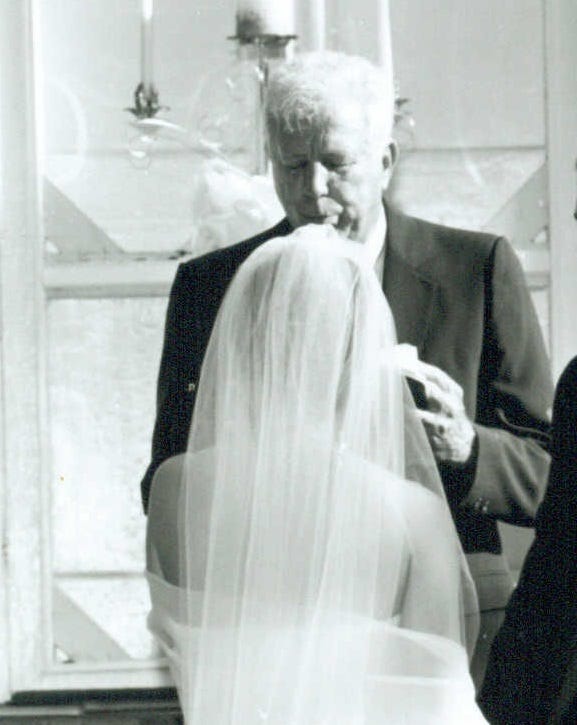
I thought I knew all about abusive relationships before I found myself in the middle of one. I thought I was too smart to get involved with someone who would hurt me physically and mentally. I thought I knew what to look for and that it would be so obvious that I needed to walk away. I thought I didn't fit into the "stereotypical" mold of what a domestic violence survivor looks like. I'm sure that once upon a time, I looked down on women who were in abusive relationships and found them weak.
Breaking the Silence
In the end, I didn't walk away from him. And I didn't tell my closest friends and family for years about what happened — most of them not until after he left me to move in with another woman four years into our marriage. Now, I tell my story without (most of) the shame; I believe it's important to share it to show others that someone can come through this and survive. And perhaps thrive. Maybe it will help someone you know. Maybe it will help you . I tell the story to help my nieces, my friends, my colleagues, myself.
People are often baffled by how beautiful, intelligent women fall in love with (and even marry) abusers. The truth is that it happens very gradually. It begins with a sarcastic putdown, and is followed up quickly by an apology. It may escalate to a kick or a slap, with more apologies and promises that it will never happen again. By the time I realized that I was in a bad relationship, I had invested so much of myself and my self-esteem had been chipped away so drastically, I was terrified to be alone.
You may know someone who has been abused, and you can't understand why she doesn't leave. She may be afraid that no one else will love her. Perhaps she has kids and doesn't know how to provide for them on her own. He may have threatened to kill her. She may be so ashamed that no one knows the extent of the abuse and suffers in silence. He may be someone powerful or well-liked in the community, and she is afraid no one would believe her.
This post is part of a Good Housekeeping series of stories about domestic violence and abuse . If you or someone you know is at risk, reach the National Domestic Violence Hotline at 1-800-799-7233 . If you are in danger, call 911. More information and resources are available at the National Resource Center on Domestic Violence or the National Online Resource Center for Violence Against Women .

@media(max-width: 64rem){.css-o9j0dn:before{margin-bottom:0.5rem;margin-right:0.625rem;color:#ffffff;width:1.25rem;bottom:-0.2rem;height:1.25rem;content:'_';display:inline-block;position:relative;line-height:1;background-repeat:no-repeat;}.loaded .css-o9j0dn:before{background-image:url(/_assets/design-tokens/goodhousekeeping/static/images/Clover.5c7a1a0.svg);}}@media(min-width: 48rem){.loaded .css-o9j0dn:before{background-image:url(/_assets/design-tokens/goodhousekeeping/static/images/Clover.5c7a1a0.svg);}} Relationships

The Sweetest Birthday Wishes for Your Wife

Unique Birthday Wishes for Daughters

Touching Birthday Wishes for Girlfriends

The Sweetest "Happy Anniversary" Wishes

Anniversary Quotes That Celebrate All Love

100 Best Birthday Wishes for Friends

The Best Love Messages

Thoughtful "Thank You" Messages for Any Occasion

Sweet "Good Morning" Messages to Send

How Strangers Helped Me Fix My Love Life

Beautiful Quotes All About Friendship
- Share full article
Advertisement
Supported by
Modern Love
My Twisted Path to a Meaningful Life
A bad night of partying left my body broken and nearly paralyzed. I let the pain shape me for the better.

By Grayson Zulauf
I lifted the sheets to look at my right ankle. Bruised, maybe broken. My back hurt, too. I called my friend Danny to take me to the emergency room. We laughed about our big night out while limping down the stairs, driving south on I-91 and sitting in the waiting room — until the doctor said I may have broken my cervical spine and could become paralyzed.
When the doctor pulled on a latex glove for the anal muscle exam, Danny stepped behind the curtain to call my mother. She asked him what happened. Danny told her he didn’t know. I had passed out on the couch of the third floor of the fraternity house, but I woke up in a bed on the second floor. Everything in between was a blank.
Suspecting that Danny was lying to protect either me or himself, my mother got in her car and drove to the hospital to find out. From Colorado. To New Hampshire.
A week later, she wheeled me from the hospital to an extended stay hotel to recover. My tibia-fibula and lumbar spine fractures were immobilized in hard white casts — and I was 40 pounds lighter. But not paralyzed.
Our first night there, at 1 a.m., the fire alarm went off. In the rush to safety, my wheelchair got stuck in the doorway; it couldn’t summit the lip of the door frame. My mother rescued me with a pair of backup crutches. I hobbled to the parking lot, nightmares of a fiery death looping in my head.
We returned the wheelchair and refilled the painkiller prescription. A few days later, I went back to my senior year of college on crutches, hazy and housed in a room with special accommodations.
And that’s how I started my last year of college, a year I had thought would be full of partying, girls and just enough school to get a job. Now I was facing a year of pain, crutches, recovery and self-pity. Twice a week, I went to physical therapy to relearn how to sit up straight. Every day, my mother called and said, “How are you doing? What happened that night? Stop lying to me.”
For the first time in college, I slowed down. I traded late nights out for long meals in the cafeteria with friends who were kind enough to carry my food tray. I treasured my classes and professors, signing up for faculty dinners and actually doing the reading.
One of my courses was drumming, an easy “A” for science majors who needed to fulfill an art requirement. To start every class, our professor would ask us to rate how we were doing on a scale of 1 to 10. It was rumored that you did better in the class if you ranked yourself high, so I was always an eight or above, despite my full-upper-body brace, leg brace, crutches and painkiller haze.
When a pre-med student rated himself low because of a bad grade in organic chemistry, the professor pointed at me and said, “Look at him. He’s an eight! How can you be a three because of a test?”
There was one other person on campus using my situation for a boost. Near the food court one day, I saw a pair of soccer teammates, Kim and Emma, whom I barely knew. Kim was also on crutches with a torn ACL.
Seeing me, Emma said something to Kim, and they both laughed.
Later I learned why: To cheer Kim up about her missed soccer season, Emma had said, “At least you’re not that guy!”
Hobbled or not, I was responsible for planning our quarterly fraternity formal party. I went dateless since I could barely walk, much less dance. But I still needed to find designated drivers for the night. My friend Annie offered to drive, and she invited Emma along.
Annie and Emma came early to drive Danny and me to the venue so we could set up. I rode with Emma. We started talking about her philosophy class on free will. Free will is an illusion, she had decided. Or not.
The next morning, I emailed Emma to see if she wanted to go to dinner. Emma told Annie, who knew me better, about the invite.
Annie said, “He’s always in it for the wrong reasons.”
She was right. Emma still said yes.
We sat by the window. I wore sweats since real pants didn’t fit over my cast. I left Danny at the library, in disbelief that I had nearly finished my final paper and that I had an actual date, my first ever. Never had I asked a girl out to dinner or coffee or on any sort of respectable outing. Everything had been casual hookups, fraternity and sorority mixers, drunken encounters.
Unsure how it would go, I prepared three questions on a notecard to ask at conversational lulls.
Emma ordered a goat cheese pizza. I had macaroni-and-cheese. We talked about her upcoming internship back home in Michigan and my injuries. At the first pause, I got nervous and went to my notecard: “How was your soccer season?”
At our parting point on the college green, we paused to say good night. Emma was holding her leftover pizza with both hands and saying something important, or long-winded. I interrupted with a kiss. She kissed me back, as much as one can while clutching a to-go box.
I crutch-ran back to the library. With the addition of a kiss to my now-successful date, Danny was even more incredulous: “There was no date! Show me the email!”
I emailed Emma to ask if she would like to watch a movie in my room. She said yes. I showed Danny that email and left him for the second time that night.
We graduated and got our first jobs. Two years to the day after my injury, a college friend, Jonny, fell down a flight of stairs after a night out in New York City and died. At 23, from a traumatic brain injury. When I heard the news, I thought of his mother. Then I thought of my mother, knowing that could have been me, and stopped feeling sorry for myself.
Over time, my leg healed, and my back mostly healed. Every few months, my back locks up and I can hardly move. When that happens, I take a week off and tell my co-workers that I injured myself skiing. At only 33, I can’t help but wonder how much worse and frequent these episodes will get as I age.
When the pain is unbearable and my guilt and self - pity return, Emma runs me ice baths. She strokes my hair and kisses my face while I lie on the couch after a day of sitting. She “camps” with me in our living room, where the stiff floor provides more back support than a bed. She tries to ease the pain with an amateur massage, or at least wields the massage gun with gusto. She moves our couches and books and picks up whatever I drop. She tells me to do my physical therapy and to exercise. She reminds me about everything I love and can still do.
We cook, with Emma standing and me sitting. We binge shows while lying on the floor. We travel on long flights with seat cushions and foam rollers and lacrosse balls, and Emma always takes the middle seat. We talk about how we were fated to be together because free will is a lie. And two years ago, we got married.
Our lives are shaped by pain, but more by love. I told Emma in my wedding vows that my life story is the story of the luckiest boy in the world. We laugh and love and play like puppies, as Danny calls us, through and around and during the pain. Even as it gets worse with each year, the pain is what I make of it: a footnote to the love story.
Last year, 12 years after our first date, we found ourselves back in our college town and went to the same restaurant for dinner. The goat cheese pizza was no longer on the menu, so we split the mac-and-cheese. Then we walked to the green to finish the re-enactment of our first kiss. Except that Emma was sure it happened under the tree in the corner, and I was sure we were on the sidewalk across the road. We pleaded our cases but never kissed, unable to agree, and then walked back to the car.
For my mother, the truth: I never knew, and I still don’t know, how I broke my back and leg, but I have stopped caring. I do know this: That night, I fell into a lifetime of both pain and love. And I would choose it again — if the choice ever existed at all.
Grayson Zulauf, who lives in Burlington, Vt., builds companies that fight climate change.
Modern Love can be reached at [email protected] .
To find previous Modern Love essays, Tiny Love Stories and podcast episodes, visit our archive .
Want more from Modern Love? Watch the TV series ; sign up for the newsletter ; or listen to the podcast on iTunes , Spotify or Google Play . We also have swag at the NYT Store and two books, “ Modern Love: True Stories of Love, Loss, and Redemption ” and “ Tiny Love Stories: True Tales of Love in 100 Words or Less. ”
A Guide to Better Romantic Relationships
Looking to build a long-lasting partnership we can help..
If you live with a messy partner, these tips can help you find peace amid the piles .
Overwhelmed by dating apps, profiles and not-quite-matches? Here’s how to start fresh .
We asked 14 psychologists, counselors and therapists for book recommendations that can help nourish relationships. These seven titles rose to the top of the list .
Ignoring a partner in favor of your phone, or “phubbing,” can lead to feelings of distrust and ostracism. Here’s how to stop .
Fighting with your partner? These sentences can help you share grievances in a more constructive way . And here are the things you should avoid saying .
Managing libido differences is a common part of relationships. Here’s some advice that may help .
Do you worry that you and your partner are growing apart? Here are simple but helpful questions to ask before it is too late .

IMAGES
VIDEO
COMMENTS
Love is a universal theme that has captivated writers, poets, and artists for centuries. From Shakespeare's tragic tale of Romeo and Juliet to modern-day romantic comedies, love has always been a central focus in storytelling. In this narrative essay, we will explore the complexities of love, examining its different forms and manifestations.Through personal anecdotes and reflections, we will ...
Writing Narratives With 'Tiny Love Stories'. This New York Times feature invites readers to tell love stories from their own lives in no more than 100 words. Let your students give it a try ...
Love is a multifaceted and complex emotion that has the power to shape our lives in extraordinary ways. It can bring immense joy and happiness, but also heartbreak and pain. In this personal narrative essay, I will explore my own experiences with falling in love and the profound impact it has had on my life.
Relationship Narrative: Personal Narrative Essay. The fairy tales say that once upon a time a girl met a boy; they fell in love, and lived happily ever after. Reality is not that simple. Long-term relationships force couples to get to know each other, involve themselves in each others' worlds, fight through the hard times, and eventually ...
Brian Rea. By Ada Calhoun. It's unrealistic to expect your spouse to forever remain the same person you fell in love with. 13. After 264 Haircuts, a Marriage Ends. Brian Rea. By William Dameron ...
In fact, we've just published a list of 650 of those questions that ask for personal and narrative writing, on topics like sports, travel, education, gender roles, video games, fashion, family ...
The word love has power; enough power to make even the sanest people go insane. We come to learn this word at such an early age. As children, our parents tell us they love us, we tell our friends we love them, you might even tell your boyfriend or girlfriend you love them. But what if the person who told you they loved you breaks your heart?
Generally, love refers to some kind of inexplicable feeling which is felt by people towards others, probably those of the opposite sex. Relationship on the other hand would refer to the condition of people being connected or associated with each other. We will write a custom essay on your topic. 809 writers online. Learn More.
However, like any other type of writing, it comes with guidelines. 1. Write Your Personal Narrative as a Story. As a story, it must include an introduction, characters, plot, setting, climax, anti-climax (if any), and conclusion. Another way to approach it is by structuring it with an introduction, body, and conclusion.
5 Essay Examples. 1. Love and Marriage by Kannamma Shanmugasundaram. "In successful love marriages, couples have to learn to look past these imperfections and remember the reasons why they married each other in the first place. They must be able to accept the fact that neither one of them is perfect.
A personal narrative essay can be best described as creative nonfiction about your experiences. We can help you learn how to approach this personal piece. ... Think about a meaningful relationship. This could be a friend, family member, mentor, or local barista you happen to be close with. ... It is hard not to fall in love with a city like ...
Introduction. First love is a universally cherished and transformative experience in one's life. It's a rite of passage that often leaves an indelible. mark on our hearts and shapes our future perceptions of love and relationships. The memory of first love carries a unique blend of innocence, excitement, and vulnerability.
3. Create a Thesis Statement. The thesis statement is the most important sentence and tells the reader what your essay will be about. In a personal narrative essay, the thesis statement can briefly explore the story's events. Or it can tell the reader about the moral or lesson learned through personal experience.
Your love story is a narrative that gets written in tandem. is a lecturer in philosophy at Delft University of Technology in the Netherlands. She researches ethics and moral psychology, particularly personal relationships, narrative and the self-concept. Room in New York (1932) by Edward Hopper.
A personal narrative essay uses the components of a story: introduction, plot, characters, setting, and conflict. It also uses the components of argument, thesis, and conclusion. In a personal narrative essay, we tell our readers a story to make a larger argument. Focusing the readers' attention on significant, detailed scenes, we develop our ...
A narrative essay is one of the most intimidating assignments you can be handed at any level of your education. Where you've previously written argumentative essays that make a point or analytic essays that dissect meaning, a narrative essay asks you to write what is effectively a story.. But unlike a simple work of creative fiction, your narrative essay must have a clear and concrete motif ...
Till we realized there is something between us. In a nutshell, we shared a chemistry that was palpable to people around us. She was an amazing girl who brought the best in myself. She was like the sun shining in my life. Sadly, parental disapproval took us apart. The longing of lost love can be agonisingly hurting.
15 Inspiring Personal Narrative Examples for Writers. Reveal a part of yourself in your essay. Students start writing personal narratives at a young age, learning to use descriptive language to tell a story about their own experiences. Try sharing these personal narrative examples for elementary, middle, and high school to help them understand ...
Personal Narrative: Love Doesn T Love Them. quote off social media that really stuck out to me. "Stop planting flowers in people's yards who aren't going to water them". Love is hands down the worst drug in the world. No matter how hard you try and fight it off, everyone wants it. It can make you do idiotic things.
642 words | 1 Page. Personal Narrative Essay: I Am A Perfectionist As long as I can remember, I have always been a perfectionist. From the smallest details to the biggest tasks, I have always strived for perfection. It has shaped my personality, influenced my choices, and impacted my relationships…. Personal Growth and Development.
1715 Words. 7 Pages. Open Document. The love from my family and friends are life's greatest blessings as each relationship has molded me into the person that I am today. My relationships with my mother, father, Nanna, and my friends Addy and Kirsten are all ones that are meaningful to my life. By focusing on keeping these relationships strong ...
Book Report on "LOVESTORY" Lovestory, is a novel for all the romantic heads. It is a story of two college students, oliver and Jennifer,who madly fall in love with each other and get married several days after graduation. Oliver, the Harvard hockey player, is at times short-tempered and impulsive but at other times extremely emotional and ...
The author on her wedding day. I thought I knew all about abusive relationships before I found myself in the middle of one. I thought I was too smart to get involved with someone who would hurt me ...
Two years to the day after my injury, a college friend, Jonny, fell down a flight of stairs after a night out in New York City and died. At 23, from a traumatic brain injury. When I heard the news ...